#mary's entire journey of full self-actualization
Explore tagged Tumblr posts
Text
In vain I have struggled. It will not do. The past few weeks have been a torment. I cannot complete the essay on how Pride and Prejudice combats amatonormativity through the emphasis on familial and sisterly relationships, and also contains extensive evidence for my aroace Mary headcanon and how Jane Austen inadvertently created one of the first queer characters in British media by 11:59 tonight. I have fought against the threat of failure in the class, my worse judgements, and the great admiration of my beloved feminist literature teacher. I am now in need to ask her to put aside all that and end my agony.
I hate this. Most ardently. Please do me the honor of allowing me to make it into a Tumblr post.
#pride and prejudice#the thoughts of lit students everywhere#why do you have to ruin this for me#i mean come on#i mean#i know that the darcy x elizabeth stuff is the focus of the novel#at least in pop culture#but it glosses over so much#including sisterly#platonic#and also#mary's entire journey of full self-actualization#which austen herself glosses over#in favor of the romance#because even then#who would want to read a novel about a protagonist who doesn't like men /s#or even women#/s#which when you think about it#is kind of ironic#given that the entire point of the novel is to question traditional ideas of marriage#that basically a character who is canonically aroace as they can get in the regency era to even exist and to be seen#as valid#worthy of love#and also has some of the greatest lines in the novel#and film adaptations#is really awesome#because if the terms#aromantic#and
45 notes
·
View notes
Text
Lucien Lachance x Antoinetta Marie Headcanons
I have recently been compelled to crawl out of my hole and spread propaganda. Since other WIPs currently hold priority I'm unsure when I will actually write for these ideas, but they refused to leave me alone. Thus, enjoy a self-indulgent thoughtdump on my dumb little rarepair OTP. I am normal about them 🥺
It was an open secret to literally everyone in the Sanctuary that Antoinetta was madly smitten with their Speaker. Everyone including the Speaker himself. He never openly showed any reciprocation, or even any acknowledgement to this attraction beyond a humored look or shake of the head at her antics, or when a Brother or Sister teased about it on occasion. After all, they would reason- it must be a passing fancy, right? She'll get over it.
One day, Lucien catches wind of Antoinetta's little boasts - perhaps the remark about, say, taking Ocheeva's place one day? He thinks that, hmm, a mere Slayer speaks so assuredly! It may be entertaining to test her. He had once used everything in his power to save her life; he'd like to ensure such an investment does not throw her life away from growing arrogance. When he finds time to spare the Speaker plans a personal murder for her to undertake, and accompanies her on the journey to examine her progress. One thing leads to another. Then another. Whatever happened out there, their Brothers and Sisters most certainly noticed they appeared... closer than before when they returned.
However, theirs' is a private affair. It's another open secret, yes, but not one they care to flaunt or tease. Antoinetta might think it would be fun to run her mouth off about it, as she's known to do with most things, but her respect for Lucien prevails over her urge to gossip.
Antoinetta had a strict habit of calling Lucien 'Speaker' to his face, and it took her awhile to break out of it. She knows how dedicated he is in his role and wanted to express her utmost respect of that. He stops her one time and says: "Darling, when it is only us? You need only call me Lucien." Darling? She swoons and nearly faints.
When their schedules allow spare time together, their dates are of two varieties. One is full-blown homicide; the other is a shockingly innocent outing, such as dinner or a walk along the Cyrodiil countryside. There is often overlap between the two. Nothing screams romance to two serial killers like a waltz in the field while covered in blood and guts!
Lucien tends to let Antoinetta choose the occasion or location of their more pleasant trysts. He understands that she had lived a caged life before the Brotherhood, and wants to allow her the freedom to... well... simply live a little. It delights him more than he openly admits to see when she gets struck with wonder or excitement at a new sight or experience.
Antoinetta adores Lucien's robes. They are shockingly comfortable; it carries his weird scent of alchemy reagents and dead things; and it serves as a symbol of what she one day hopes to achieve within the Brotherhood. Yes she's put them on if ever she's awoken before him. Yes he has caught her in the act. She was initially fearful he'd find it disrespectful, but he just shrugged and let her continue. It's not that he found it... dare he say... endearing or anything. No. Not at all (lie). But she wasn't stealing it - not breaking a Tenet - so let her have her fun.
That silver dagger Antoinetta uses was a gift from Lucien. He is a man to put functional gifts in mind. If his lover cannot commit harm with the pretty thing he bought them, what is even the point? He once gifted her a bag of potatoes during a tryst; he was enamored to later watch her bludgeon a man into a coma with it. That was the moment when he subconsciously realized... by Sithis, he thinks he loves this woman.
I had an entire section written for how this ship would be affected by the events of the questline, but I believe it warrants a separate post. Enjoy the general fluff now; save the doomed romance for later 😏
Individual Lucien Lachance Headcanons
#lucien lachance#antoinetta marie#may I propose this ship to be called...#lucienetta#VS BS#headcanon#my writing
19 notes
·
View notes
Note
Hi!
I love your fics! 💖
I want to start writing too and I have a question for you.
I saw that you shared a screenshot of the draft of the royalty story and I noticed that you are working with smaller margins in your document. I just realize that it would help me if I do the same (because of Tumblr's phone format). This is really clever. Can you tell me exactly what is the size of these margins?
Also, do you have any useful tips like that that could help me as a new author on Tumblr? What do you do exactly when you are ready to post a story? (Headliners, image, etc.)
Thank you so much! 💖💖💖
Hello, anon!
Thank you so much for enjoying my writing! May your journey here be fun and gratifying. It's always exciting to get into something new, I'm sure you'll do a lovely job. <3
I'd be happy to share more of my process in case it helps you with anything. Though just a quick disclaimer: this is how I do things, and isn't universal or for everyone.
With that being said, info dump under the cut!
1.) writing the thing✨
For brainstorming ideas, I use the notes app on my phone. For the fics themselves, I write on google docs! I like it because it works both on my phone and pc.
I have a specific format, but it's not actually the margins that I change. I write with the pages halved using columns! These are how my files look like on pc:
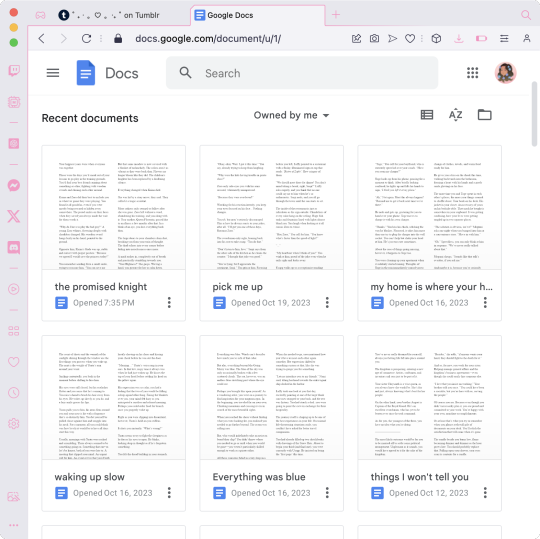
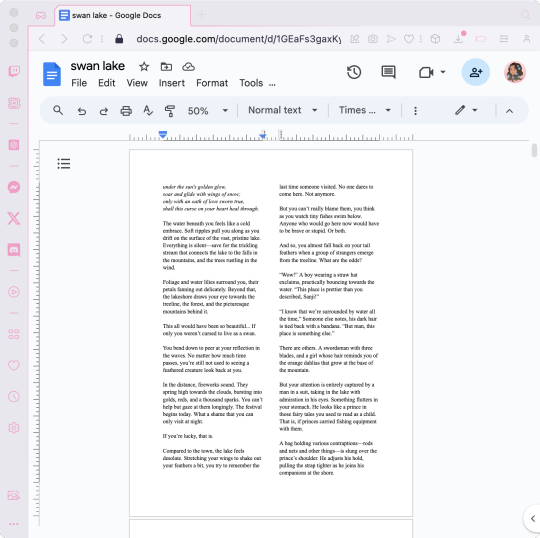
You can do this by going Format > Columns > 2! I like to write in TNR 12 like a research paper lol. (Though, I can't remember if you can do the columns on the docs app, because everything looks like it's just one column there. But once you set a doc in this format, you can just duplicate the file and it'll still show up with columns on pc.)
Like you said, this helps me gauge how a fic will look like on mobile, since that's where most people are reading. It also helps my peace of mind since a full, blank page without columns can be a bit intimidating. It can feel like you have to fill up the entire thing, when you really don't!
Another brilliant thing about google docs (on pc) is that, if you use italics or bold in the file, when you copy paste it onto Tumblr, it retains those italics and bolds. This saves me so much headache and I consider it a lifesaver.
2.) formatting (and by extension, branding)✨
I feel like this is really vital on Tumblr, since an established aesthetic can help readers remember and recognize your blog better. My advice would be to pick one or two colors and always use them on your posts.
You can also pick an emoji and use that with your aesthetic! For example, I associate the sunflower emoji 🌻 with the wonderful @songsofadelaide. (hi Mari! hihi)
If you want to use them, have a default divider. Mine is just a png of a blue line haha, but you can get creative with it. Though I suggest you keep the photo thin so that it doesn't eat up too much space.
Off the top of my head, I think the most important things on a post are: the title, header, and preview. (I'll make a separate point for preview since it's a lot.)
TITLE : Self explanatory!
HEADER : A header does more than make the post look pretty, it helps you differentiate fics when Tumblr only shows you the fic thumbnails on archive or on notifs. I have a folder of manhwa screenshots that I save for headers, and I add an overlay with my blog's signature color using a drawing app. Gifs are also fine as headers, though I don't personally use them because gifs make Tumblr crash on my phone sfhlsdjfkl, but that's just me!
3.) the preview ✨
(I don't think preview is the official term for this, but it's what I've started to call it.)
When I say preview, I'm talking about everything below the header and above the fic. Mine looks like this:

It's up to you what you want to add, but I would say to always keep the blurb/short summary, genre, and word count. Everything else is optional, and you can play with whatever suits your style best.
For the blurb, you can go one of two ways: keep it short, or go more in-depth with the summary.
If you keep it short: One sentence is the best, but two should also be okay. It doesn't have to summarize the whole fic, but give a preview of what readers can expect from your work. I use my blurbs to hook in readers, then use the content notes to make up for what I didn't add in the blurb. If you go in-depth: This would be a standard summary, and you can get away with not needing content notes.
AH. Can't believe I almost forgot, but always add warnings and MDNI tags if your fic needs them! (Some people also use a banner for warnings. Search 'mdni banner' on Tumblr and you'll see examples.)
Once you have a preview format you want to stick with, always use it and keep it consistent! I have a draft with just my preview format so I can just copy paste it whenever I post a new fic.
I'm sure you can find guides for anything specific you're curious about if you search here. But of course I'd be happy to answer more questions if you ask! Also feel free to shoot me a dm <3
I hope you don't mind that I went on a bit of a tangent haha! I wish you the very best with your blog!
5 notes
·
View notes
Text
Jin Shin Jyutsu, a (partial) operating manual of our body.
26 points x 2, two hands, ten fingers, ten toes, and a few maps. This is what an Ikea manual would show in its technical sheet aiding to assemble the piece.
I oversimplify it to get the point across.
Of course only The One has the Knowledge of our parts. And not all humans especially at the time that I write has the two hands the ten fingers and the ten toes, and am not only referring to birth deformities or accidents, I am now referring to the butchering that the Zionists have brought onto an entire people leaving a population of amputees.
But I imagine even in the loss of limbs Jin Shin Jyutsu can offer reroutings.
I write about 48 hours from the completion of a workshop on Mary Burmeister's Self Help Book II given in Arabic by my teacher Laila Moustafa. I write over a year from the start of my journey with Jin Shin Jyutsu, and I say, subhanaLlah at awe by God's creation, the human, and the tool provided to the human embedded in the human.
It is a great gain to humanity for this knowledge to have been recomposed, revived, by Jiro Murai if those two words describe what his contribution was.
To have one's being and to relegate that being to others entirely, in how we seek medicine, in how we seek mental health, speaks of an era of poverty when the riches are within us, nevertheless at times of need supported by others. I take a step back as well from the statement of "the riches within us". I state it in full humility, awareness, and knowledge that it is God the Creator of all things and bringing the awareness of how uniquely great this creation is, that is us, is part of believing in the Creator, away from sidelining that fact.
At age 46 I discover an illiteracy: I am now learning the alphabet of my physical existence, through 26 x 2 points, ten fingers, ten toes, and guided by maps.
I feel relieved. Like I have come across a life gift, what we call in an Islamic practice, al akhth bil asbab الأخذ بالأسباب, moving forward with all the means available, in tandum with reliance on God tawakkul توكل.
Now starts the journey of actually learning to apply the means and see where that takes me.
I set a high intention to have it be knowledge that I share as I learn it myself, aware that having been blessed to come across such knowledge and have the teacher from whom I can steadily learn, is a great blessing and a great responsibility.
Today I see where this knowledge can find soil, in Gaza, where no mean is cuffed. When hospitals are floored, equipment is buried under rubble, and doctors are massacred there is no space for monopolies on humans. If there is good in this knowledge, may it flourish where it is most needed.
----
Dubai, at home, Yansoon. Morning of Monday 13 May 2024, 5 Thul-Qida 1445.
1 note
·
View note
Text

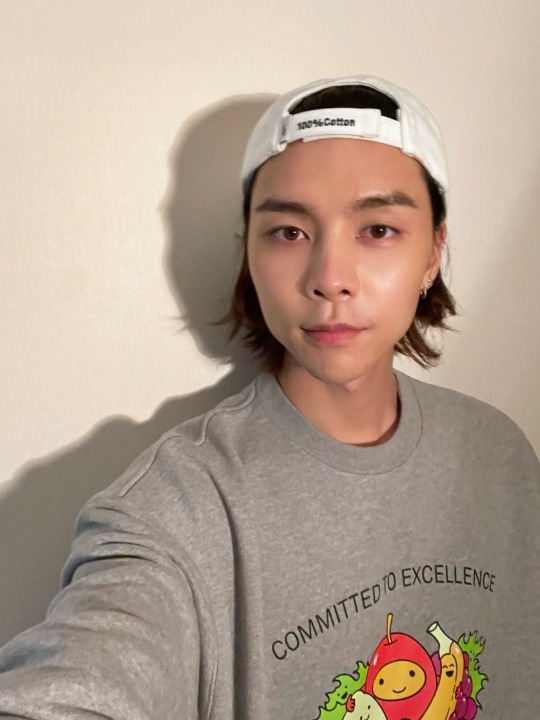
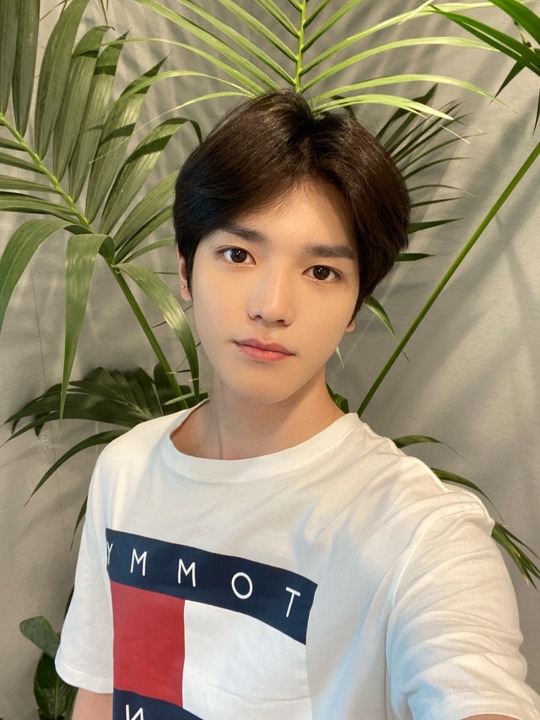

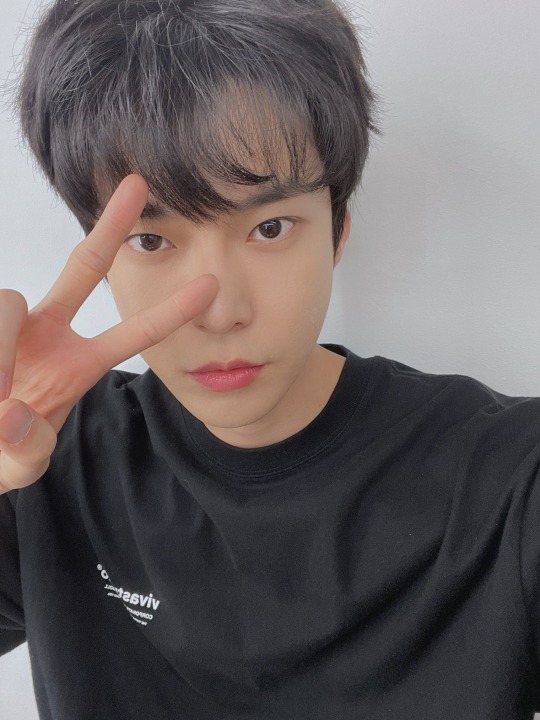
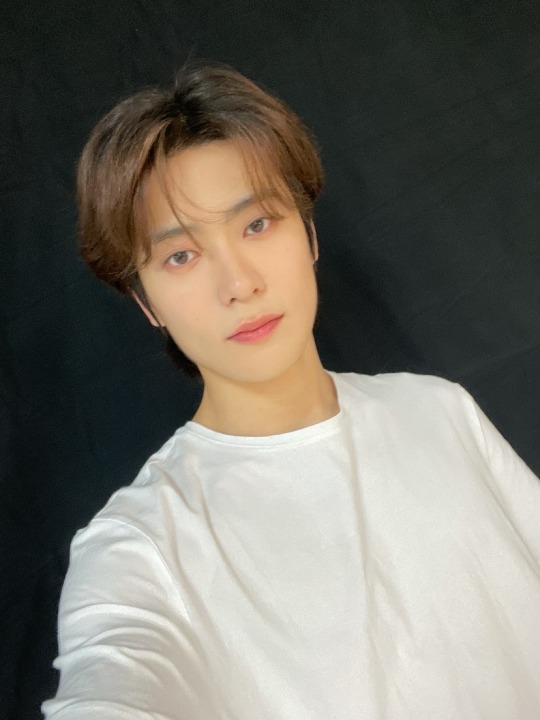



NCT 127 Reveal The Hobbies & Obsessions They Can’t Give Up In Their Down Time
In Elite Daily’s series Rent-Free, celebrities unpack the one thought, memory, or unforgettable pop culture moment that'll always live in their head. In this piece, NCT 127 reveals the interests and hobbies even die-hard fans will be surprised to learn about.
In the past year, most musical acts had to cancel their highly-anticipated tours due to the coronavirus pandemic, and NCT 127 was no exception. That’s why its members — Johnny, Haechan, Mark, Taeyong, Jaehyun, Yuta, Taeil, Jungwoo, and Doyoung — have taken every opportunity to get closer to their fans with new music. After dropping their second Japanese EP, Loveholic, in February, the group returned on June 4 with “Save,” their latest single all about making unforgettable memories. Up next? An entirely new era. On July 7 (the group’s fifth anniversary), they announced their next album is coming in September. In celebration of all the exciting things ahead, NCT 127 opened up about how they wind down after a hard day’s work.
NCT 127 tells Elite Daily these past five years as a group have been worthwhile, and it’s all thanks to their fans, called NCTzens, who have supported them throughout their journey. “[We have so many] memories from practicing together pre-debut to our actual debut stage, and also all those times we spent working on our music and performance to meet our fans at our first concert and first world tour as well,” the group collectively says. “Each and every moment we spend on our music is for our fans, and we are working hard to better show ourselves in various different ways, so we hope you’re all excited!”
Fans have impacted the group so much that they’ve become the muse behind NCT 127’s biggest tracks. “The inspiration [behind ‘Save’] comes from wanting to save our precious memories with each other and with our fans,” the group says. And NCT 127 hasn’t let go of a single one. While they haven’t been able to perform in front of a live audience since early 2020, they held their online Beyond The Origin concert in May. They add, “It was new getting to meet fans from every part of the world at the same time.”
While the guys have their hands full recording their next project, they’re making sure to get some much-deserved R&R whenever they can. Below, NCT 127 reveal the interests that have been living in their minds rent-free.
Johnny
Johnny is a major fan of horror movies. “I love how they keep you on the edge of your seat the whole time you’re watching,” he says. His favorite scary movie of all time is Shutter, which is about a couple who accidentally run over a woman and then see her ghost in photographs they develop. “Even though I watched it when I was young, I still remember the movie, and it’s one I think about often. I’ve seen the movie multiple times since I first saw it in high school, and I recall being scared of red-lit rooms for quite some time afterward,” he says.
His most recent watch was The Conjuring franchise. He adds, “After I saw the movies, I looked up some articles about the behind stories. They were pretty interesting!”
Taeil
Taeil keeps music on his mind even after a full day of rehearsals. “Audio speakers really amplify music so you can hear the intricate details of the track, and there’s also that sense of excitement from when you hear a sound you like!” Taeil says, explaining his love for audio. “I like the speaker brand Focal. There’s still a lot I don’t know about speakers, but I find the brand very attractive since you can experience a flat sound that’s similar to what the songwriter intended to create.”
Taeil says the group’s sound has changed a lot since their debut in 2016. He says, “With time, our team color is definitely becoming more distinct and defined. I think the sound we have now is a very captivating one with strong hip-hop and R&B colors.”
Taeyong
The group’s leader enjoys connecting with others, but especially with NCTzens. “[Our relationship] is a very precious and one that I’m truly grateful for. Not only do we enjoy the same things, but we also try to improve and show that to each other. All of this is very special and meaningful to me,” he says. “It’s nice to learn of each other’s culture, and by singing in different languages, it makes me feel as if I’ve grown closer to our fans from those countries.”
Yuta
Yuta loves exercising because it’s very rewarding, and although he doesn’t have a specific fitness routine, he prefers working out at a gym rather than at home. “I like how exercising makes me feel stronger and helps me to build up my strength... which is very helpful when practicing group dances that require attention to body angles,” he says. “We had a short preparation period [to learn ‘Save’], but I was able to learn the choreography quickly and had a fun time preparing.”
Doyoung
Ever since he was cast as Axel von Fergen in the Korean adaptation of Marie Antoinette, which is based on the 2006 musical of the same name that originally premiered in Japan, Doyoung has found a newfound appreciation for theatre. “I find it very precious how you can share emotions through singing and acting,” he says. “It’s been very meaningful preparing for my musical debut, and it’s really all thanks to the amazing seniors and producers! The process in itself has been a very fun one, and I have been preparing with a heart of gratitude.”
Doyoung is set to make his musical debut on July 13 when the production opens at the Charlotte Theater in Seoul.
Jaehyun
Jaehyun says he “fell in love” with tennis in April because it helps relieve stress. “I’ve always enjoyed trying out new sports like basketball, bowling, and boxing whenever I had the chance. But I actually started tennis because my father recommended it,” he says. “I know this is the case for all sports, but tennis isn’t something you can master after a few tries. It requires persistence, and I started to enjoy it even more as I saw myself gradually improving.”
Jaehyun’s favorite tennis player is Jannik Sinner, a 19-year-old Italian athlete who competed in the 2020 French Open as the youngest quarterfinalist in the men’s singles event. He says, “I’d really like to go see a tournament.”
Mark
Lately, Mark is interested in taking better care of his hair. “It’s really important to me because I change my hair color a lot, and because I want my hair and scalp to be healthy,” he says. While he’s experimented with just about every color in the rainbow, there’s one he always loves going back to. He adds, “I think I liked my blue hair the most. It is my favorite color, after all, and I believe my fans liked it as much as I did. I was glad to be able to film the ‘Save’ music video during my blue-haired period. It fit well with all the scenes and the aesthetics!”
Jungwoo
Similar to Yuta, Jungwoo has also had exercising on his mind. “My life has become more lively since I started exercising. More so than exercising to improve my physique, I exercise in order to have a healthier, richer life. Also, it makes me proud knowing I’m spending my day more productively,” he says. “The first thing I do after I wake up is to start off the day with simple stretches that improve body balance... Stretching helps to warm up the body, which reduces the risk of injury, and can also boost your mood! I think this is why when I dance, I’m able to express those movements in more detail.”
Haechan
Haechan is now experimenting with all things fragrance. “I started using perfume since scents can give a sense of self-satisfaction and because I wanted to smell good all the time!” he says, adding he doesn’t have a favorite perfume. “The scent that suits me well, that I personally like, and that will suit me is always different!” However, there’s one scent that will always remind him of a certain memory with NCT 127. “This might sound funny, but I’d have to say the smell of sweat in our practice rooms,” Haechan says, adding it’s “satisfying” because it makes him feel like they worked hard after a long day. As for what draws fans to NCT 127, Haechan credits their “sincere music and performances.”
© Elite Daily
105 notes
·
View notes
Text
Why the ATLA comics fail when it comes to Zuko and his family
To whom ever took their time to actually stop and read this post, thank you in advance for not skipping my post and willing to stay and read my humble opinion! I hope I won’t disappoint you!
As a relatively newcomer to the ATLA fanbase since 2020, I’ve come across a lot of interesting debates, comments and rants about the show, characters and fandom in general, but nothing has captivated me as much as the dumpster-on-fire that are the ATLA comics, more specifically: The Promise and The Search.
On one hand we have the hardcore fans who want them to be animated or serialized into the Netflix live action, praising the comics for the new views and subject matters they’ve brought into the show’s lore, while on the other hand we have the furious Azula fandom who is really angry for the fact that best girl didn’t get the redemption arc she rightfully deserved so much after the painful event that was the Last Agni Kai and the even more angry fans of the Urzai ship (yeah, the people who actually ship Zuko’s parents unironically) who hated the retconning of the show’s cannon since the comics basically took a huge fat dump on what was previously established as official cannon, when the Search entered the scene, but between these two sides, who has the more valid point? In the end, are the comics good cannon or bad written fanfiction?
Well... Here are my two cents on this matter since I myself happen to be an Azula and Zuko fan and had huge expectations from these comics (since I wanted more from my fave hot-headed fiery siblings duo) but ended up disappointed: the comics are indeed a huge mess and actually bad written fanfiction when it comes to Zuko and his family! Don’t click off yet, because I actually documented the reasons why exactly the comics fail in this area:
1. The author of these comics is not part of the BryKe duo
Yes, I would like to start with the fact that if you actually take a second to look up who in the heck took the time to write these two books, you won’t find Bryan, nor Mike, but a fellow man named Gene Yang. This is important because while the wiki of both The Promise and The Search state BryKe as the creators, that doesn’t mean that they were the actual minds behind these comics, but rather because ATLA is their “baby” and these comics involve their characters, over which they have copyright. Mr. Yang here is the actual brain behind the plot, as the main writer, which explains why we find huuuuge inconsistencies between the show lore and the comics, especially Zuko wise.
My main issue with Mr. Yang isn’t that he isn’t BryKe specifically, but because he did an unforgivable mistake in his writing process: He projected himself into Zuko’s character, based on the relationship Zuko had with his father. This is a documented fact from an interview in which he explains that he sees himself and his dad’s relationship into Zuko and Ozai and used that when writing their interactions and built Zuko’s character in the comics. And this is wrong because when you have an already very developed and complex character such as Zuko, you can’t just come in and be like “Oh, I was an angsty teen just like him in my teenage years, fighting with my dad and whatnot, so he must have the same thought process as me!”. NO! This is bad fanfiction writer behavior! Zuko has his own personality and philosophy, which he developed over the course of 3 seasons and is not defined by only 1 unfortunate aspect of his past, so you can’t just base his whole mindset and actions off of your own personal experience just because you had the same daddy issues he had!
2. The whole “Promise that you will kill me if I turn out like my dad!” nonsense in The Promise
Reason number 2 why these comics fail and go under the category of “bad fanfiction” is because they fail to convey the core essence of the source material. The whole point of Zuko’s redemption was that he realized the wrongdoings of his ancestors and his own mistakes. He outgrew his desire of gaining his father’s acknowledgement in favor of choosing his own destiny. Having him worry that he’ll turn into his father is utter nonsense and feels like poor angsty drama material for the sake of angst. At this point in time, Zuko has overcame that obstacle in his life a long time ago and should be at the level where he himself is the “Uncle Iroh” for other people and in no way someone concerned of becoming their own worst enemy!
Not only that, but the whole point of Aang’s journey and the story of the show as a whole was to teach us, the viewers, the importance of forgiveness, empathy and love in life. Aang didn’t spare Ozai, aka “the ultimate evil” just to flex in front of his pals or because he is a “ 12 y/o vegan pacifist monk kid”, but because he knew that killing someone, no matter of what they did or wanted to do, wouldn’t restore balance into the Universe, on the contrary, him killing the villain would have meant perpetuating the “endless cycle of hate” that plagued the world. So having Aang promise to kill his best friend in case “they turned into an evil maniac like their dad” contradicts Aang’s whole character and it’s a nonsense that throws into the trash what we’ve learnt throughout the entire TV series.
3. Azula deserved (and was supposed) to have a redemption ark
This might still be pure speculation, but I count it as a documented reason because I’ve heard quite a few people saying that there should’ve been a book 4 in the show, aka “Book 4: Air”, and no, it wasn’t The Search, but actually Zuko and Azula’s journey as Zuko helps his younger sister heal her broken mind by being her very own “Uncle Iroh”. Sure, they prolly were going to end up looking for Ursa, but the journey should’ve ended with them actually being happy and a family again and not the bs we got in The Search where a still very unstable Azula runs away and becomes the “Next Joker”! The only problem is that M. Night had to pop up and curse the world with his movie, which forced BryKe to delay the project (and eventually abandoned it in favor of Korra).
All in all, either if BryKe had this preplanned or not, it made sense for Azula to get a redemption ark, she deserved it because she was just a broken 14 y/o child! If Katara’s mom’s murderer deserved to be forgiven, so did this poor child who had no fault for what happened to her since she had a dysfunctional family! What Gene Yang did in his poorly written fanfiction was to just antagonize a broken child, turning her into a monster for the sake of friggin angst!
4. The Search is the worst of the two, being flat af character wise
And finally, getting to the point that I personally find the most annoying about these comics: The Search. This one... This one is a mess on a hella lot many levels, and just to list a few: characters are flat as fudge, being either black as vanta black (like Ozai and Azula) or pure white like Gene’s Gary Stue OC, Mr Ikem (or how I like to call him, IKEA man) and his ‘victim’ rendition of Ursa, Azula gets to suffer more for no reason (see reason number 3 to why I find this as a no no), Ursa’s whole character sucks ass (man, I could write a whole thesis on why Yang’s version of her is terrible and doesn’t match the strong woman we got in the show) and Zuko does morally wrong stuff (my man literally used his unstable sister to bribe their dad into spitting info about Ursa... Show Zuko would never do that!;-;)
Oh boy, as a person who’s seen a ton of anime and other media and read many books, I can’t begin on how much I despise this type of writing: flat characters are the worst!
ATLA characters in the show are nothing close to being flat! What I mean by that is that none of them fall perfectly into pure white (aka goodest of good characters with no imperfections) or vanta black (aka lowest and darkest twisted monsters out there), each of them are various shades of grey (like Aang who is a very light grey because despite being a very kind and nice character, he still isn’t a “perfect hero” since he ran away from his duties, practiced tax fraud with Toph, had insecurities and even threatened to kill people on ocassions like with the sand benders who took Appa) and this is a good choice because that prevents them from becoming what’s globally known as Mary Sues and Gary Stues (aka those either “perfect” characters with no flaws and/or unlimited power, or the twisted monsters full of flaws).
And the other reason why many other people hate The Search: it literally negates previously established cannon. And here comes my short essay on why this comic fails Zuko’s family (since we’ve already talked enough about Zuko himself).
In cannon and even interviews with BryKe, it was clearly stated that Zuko’s family was “once happy”. Where is this “once happy” family in The Search? All I see is pain, deception, lies and betrayal, nothing close to anything that resembles happiness. Okay, some of you might come in and say that “It’s because it was never the case! It was only lies and Zuko trying to convince himself that he didn’t live in hell forever!” and here is WHERE YOU WERE ALL WRONG! And why? Because, my dear fella, where were depicted the flashbacks of Zuko’s “happy family” in The Beach? Ember Island. And what do we know and had been even quoted in the show? "Like waves washing away the footprints on the sand, Ember Island gives everyone a clean slate. Ember Island reveals the true you." (direct quote from the show). Exactly, no matter who you are or how hard you try, you can’t hide your true self when you are on the Ember Island, best example being Azula, who’s impenetrable though shell cracked and revealed the true vulnerable child that was underneath. If Azula couldn’t resist the “spell of the island”, no one can. So this means that Zuko’s family was indeed happy once and yes, Ozai wasn’t always the douchebag we got to know in Season 3 (I have a whole nother essay on my theories regarding what could be his real past story and why he’s actually the “Zuko” of his generation, based on stuff I gathered from old wiki entries and character analyses I made, but that’s for another time, lemme know if ya’ll are interested).
And what I guess is the biggest proof why The Search did this family’s past trash is comics Ursa herself. My dude, if this woman were indeed the victim of years of endless abuse and never loved her husband, I guarantee you that she would’ve been closer to what we saw in Todoroki’s mom from BNHA and Zuko would’ve gotten that scar or even worse long before the Agni Kai, not from his “daddy dearest”, but from “mommy dearest” herself, because no sane woman would be soo affectionate and attached to a child that’s the perfect copy of their abuser, sepecially appearance wise (again see Todoroki’s mom’s case from BNHA because the stories are really similar) and in no way would’ve she been willing to sacrifice her life for said child’s sake. With this ocassion, I remind ya’ll folks that according to the ancient ATLA cannon wikis on Nick’s site, Ozai was designed with Zuko’s appearance in mind, being meant to be like a “grown up scarless version” of Zuko. So yeah, remember this with a grain of salt that whenever you simp over grown up Zuko, you involuntary simp for Ozai too.
So yeah, I guess this kinda concludes my “not so short” rant about why the comics fail and are bad fanfiction. Lemme hear your thoughts in the comments and if you agree, feel free to leave a like and even reblog.
Bye bye and remember that Momo is the true strongest character of the show!
Saby out.
#atla#avatar the last airbender#atla comics#zuko#azula#ozai#ursa#fire siblings#the promise#the search#atla rant
35 notes
·
View notes
Text
Project Hail Mary by Andy Weir **MAJOR SPOILERS**
So, this is a first, I've never written a revisit this fast.
I do often read or listen to an especially good book, again, right after I finish it. Usually because I can't get into another book until I do.
I did it with Lamb, and I did it with the Martian.
This one is going to be chock full of spoilers, I really want to analyze the main characters in this book, and I can't do that without going into details. This is why I marked the hell out of this.
Project Hail Mary is even better the second time around. This is often the case. Books are like soup. The leftovers from the fridge are often even better than when you had it the first time.
*SPOILERS* *SERIOUSLY SPOILERS TURN BACK NOW IF YOU HAVEN’T READ THIS BOOK* *SPOILERS* *THE REST OF THIS RAMBLE WILL RUIN THE BOOK* *SPOILERS*
Okay, so run down.
The book opens with our main character waking up to an annoying computer asking him basic math questions. This is detecting cognitive function, that's my guess anyway.
Our character quickly discovers a few things. First, he's in a room with robot arms tending to him, including unhooking him from various life support systems as it figures out that he is awake and functioning. He's not alone in the room, there are two others, but they are long dead. And he has no idea, who he is, where he is, or why he's there.
What follows for a little while is what I would call a psychological screwball comedy. It takes him several days to work out that his name is Ryland Grace and he is a microbiologist PhD who had a falling out with the academic community and found his calling as a Jr. High science teacher. Though exploration, experiments, and memory flashes, he works out that he is on a spaceship, the corpses were his crewmates, and he is on a mission to Tau Ceti to save earth from an alien algae like creature, called Astropgage, that is dimming the sun and setting earth on the course to an ice age that will begin to wipe out humanity in 30 years. Tau Ceti, which is 12 light years away from earth, is resistant to this energy sucking algae.
We get all the backstory of how he became a crew member aboard the ship Hail Mary, in flashbacks as his memories return. A big memory that returns? Project Hail Mary is a suicide mission, he will not be going home.
In the meantime, he is slowly trying to figure out how to save earth, while he does this, he sees a very weird spaceship and meets an intelligent alien being. This being (Grace calls him Rocky) comes from a world (Earid) that is in the same situation as Earth. Together, Grace and Rocky have to work out how to save both of their home worlds.
Ryland Grace is a complex character, he’s very very different from Mark Watney (I haven't read Artimis so I can't make comparisons to those characters).
The Martian points out that Astronauts are inherently noble, willing to risk their lives for science and a good cause.
Grace is not an astronaut. That's not to say that he isn't a good person, just that he is an average person. He can be all at once self-sacrificing and selfish.
Early on he is drafted into the research team on what would be called Astropgage as a science expert by Eva Strat, a woman in charge of figuring out what is going on and how to stop it.
Once he was released from his part in this research, he goes back to teaching, only to be struck by the fact that his students would be in their early forties when all hell breaks loose, and that they might die. He then goes back to Strat and demands to be part of the research again.
This back and forth happens a few times in the story. In fact, it becomes a big part of it. See, the crew of the Hail Mary were put into comas to ensure that they would not go nuts and kill each other on the 12 light-year (four years from their perspective) journey, a medical company discovered that 1 in 7000 people have the genes to survive long comas and still function when they wake up. Grace is one of those people, but he is not volunteering for this mission. It's not that he doesn't care, or even that he doesn't want to help, it's that he's scared. And who wouldn't be? But honestly? I think Grace has imposture syndrome and is generally very sensitive. He realized that his kids would suffer, after starting to teach a class, that speed him to become a part of Strat's team again. Events happen that lead him to being the only logical candidate for the science expert aboard the Hail Mary. He refused, Strat basically kidnaps him, sets the computer induce amnesia in only Grace and plunks him on board.
Before she does this, she harshly calls Grace out.
“Do you think I don’t know you, Dr. Grace?!” she yelled. “You’re a coward and you always have been. You abandoned a promising scientific career because people didn’t like a paper you wrote. You retreated to the safety of children who worship you for being the cool teacher. You don’t have a romantic partner in your life because that would mean you might suffer heartbreak. You avoid risk like the plague.” (pg. 392 Kindle Edition)
This all seems to be true, but we don't know Grace's full story. Other than a mention of one girlfriend in college, and brief mentions of friends, There is nothing in the book about his life before he started teaching. This could be because the amnesia has left those things fuzzy, but in my head, it's because he doesn't want to think about it. Maybe he had a bad family life, maybe he had *no* family life, maybe he had an early tragedy. Maybe he realized his short comings and that, no matter his talent, he just didn't have the temperament for acidemia.
He does like being the cool teacher, he does say he likes being looked up to, but this isn't necessarily a bad thing. He's a *good* teacher.
I had cool teachers before I switched to home school. They weren't all good. I had one that would literally just let us mess around during class because they didn't want to actually grade papers. Cool to a kid? Absolutely! Good for education? Not on your life.
Grace isn't like that, he loves science, he loves teaching, and the kids are learning.
He doesn't like animal testing, he's emotional at the fragility of humanity. In short, in his quiet way he loves life.
He leaves his comfort zone to be a part of Strat's team because he knows he's good at what he does and he couldn't look at his students and knowing they could die when he could help prevent it. That doesn't mean he thinks he will be Earth's savior, just that he can help.
He's unwilling to die.
Usually in books and movies, this translates to coward, but really? It's not. Most people wouldn't volunteer for a suicide mission, especially one this pressure filled. "So, we need you to go into a coma, go to a different solar system, save your whole species, and then kill yourselves so you won't starve to death. We good? Cool."
You can't fault a living being for wanting to live. Plus, the other crew members had time to think it through, really decide, make peace with the decision and *then* carry through with the training. Grace? He was given the training, but Strat always said it was for the science of the mission. She was a little like Dumbledore, in that she was training him in case he had to go, but never told him it was a possibility. When it became clear that he was the choice for the vacant spot, he was given less than five hours to decide, and then was told he had no choice.
He makes noble choices throughout the book, but that one choice was not his own, because Strat was given absolute power and used it absolutely.
I can't say that Strat is a villain, either. She was elected to save earth and given the power to cut through any red tape. Handed all this authority, she doesn't become corrupt, she uses this power ruthlessly, but always with the only goal being Save Earth, full stop, that's it. And even as Grace, understandably terrified, yells at her she tells him that she likes him, that she knows that he is a good man, that he will give this his all. She doesn't *want* to send this unwilling and scared man on a suicide mission. She *has* to. Strat is also complex, she is not nonsense and is committed to her role in saving humanity. I like the reason she gives as to why, toward the end of the book. She got her undergrad degree in history. She takes to heart the old saying that those who do not learn from history are doomed to repeat it.
The climate scientists and their models assumed survival based on the idea that all countries will work together for the common goal. However, Strat points out that history shows that that ideal scenario, is not likely to work. She says that most wars, up until very recently, were fought over food, and resulting in famine. As the sun loses energy and crops fail, there will be wars, and they will be over food. And that is what she is desperately trying to avoid – the horror of history brought to the modern day.
I started as a history major, and history is interwoven into anthropology – I understand this perspective.
I am not going to get into politics, but I’ve experienced the agonizing frustration of watching history repeat itself, more than once in the last couple of years. Guessing at how something will probably go due to how something lines up with a similar event in the past and knowing that if someone in power would just listen it might turn out different, or that the eventual problems could at least be prepared for, and watch it happen anyway and everyone act surprised. It’s enough to make you pull your hair out.
Strat has the knowledge and the authority to act on it, I can’t say, that in her position I wouldn’t act the same way.
That is the major difference between Grace and Strat: viewpoint. By necessity of her position and by virtue of her education, she sees the big picture clearly, Grace, however, doesn’t. He’s a microbiologist, his entire career and education is looking closely at the small things and how they would translate to big things. He studies the universe by studying the smallest things in it. It is no surprise that he would need the smaller things to make the bigger things to snap into focus. When he was forced to start research on astrophage, it wasn’t until he was faced with the small scale (his kids could suffer) to make him see his part in the grand scheme of things. Strat is right, he does avoid risk, because he’s avoiding pain, he doesn’t let things in because he feels too much. Yes, the realization about the kids, puts steel in his spine, but not before he narrowly avoids a break down. For Grace, seeing Strat’s point of view, without being able to work it though to his scale, is like yelling at someone standing too close to a mountain for not being able to see the peak. It just can’t be done from where they are.
It makes me wonder, had Strat been up front with Grace, would he have willingly gone? It takes him a while to come around to the idea of helping the project in the first place. If he were told sooner, given some time, had been able to go home, and think, I feel like he would have gone. Something would have set him on the course. Maybe it would have been one of his former students, telling him about their plans for trying out for high school track, or going to college, maybe he would have gone to his usual cafe for breakfast and found out that one of the waitresses had just gotten engaged, maybe he would be told these things and see the fear and desperate need to keep life as normal as possible in the person's eyes, and then he would decide, if, on the off chance no one else could go, he would. Until he remembers his refusal, nearly at the end of the book, he accepts quickly that he volunteered for the mission. Of course, that could have been simply because he couldn't imagine someone forcing someone into something like that, but even as his memories and sense of self come back to him, he doesn't have a sense of terror or blind panic at the fact that he's not going home. I would think that if his unwillingness were something hard wired into his personality, he would know soon after remembering who he is, that he would have never considered being a part of the voyage.
So, I think, had Strat told Grace early on that he had the coma resistant genes and that there was a small possibility that he may have to be the backup for the backup, and then allowed him to come to terms with it, he would have gone without the drama. Don’t get me wrong, there is the possibility that he would have run off and had to have been hunted down, but I think, just like when he went to his class and saw his students, something would have made his conscious kick in, and he would have come back.
That might have been interesting, him running scared for a little while and then coming back? Might have given a little more background into why he is the way he is. But that’s not really what this book is about, I think it’s a forgone about conclusion that Grace would have helped, but what’s really interesting is how Grace and Rocky work together.
Rocky is cool! I love that Weir didn’t go the easy route with the creation of an alien character. Rocky is no Roswell gray with a humanoid form. No no, for our sympathetic alien, we have a spider like creature with liquid mercury for blood who “sees” with echolocation and speaks in musical notes. And it works!!
Rocky is expressive and funny and is great with Grace. It’s hilarious, other than the Russian scientist on Project Hail Mary, he doesn’t get along with anyone as well as he does with Rocky, out of everyone in the book, Grace connects most with a spider shaped rock being, he has to make a computer program to speak with.
Rocky is a tad steadier than Grace, but that makes sense simply because of the two, Rocky knew what he was getting into, and Eridens not only have more time before their star dims to the point of causing a problem, but also, they live a long long time, so, Rocky knows he is going home. But the steadiness is also built into his personality. He and Grace are both analytical problem solvers, but seeing that Rocky is an engineer, his focus is to fix things. A problem arises, and his first reaction is “I will fix that.” He won’t be dissuaded until he has all avenues exhausted.
Grace has a habit, early on, of moping for a little while before rallying and getting to work. His interaction with Rocky brings that pouting time down a bit, and he even pulls Rocky out of a slump a time or two.
The relationship between these two is interesting because Grace says flat out that he is not a social person, he feels awkward in groups with people. But he easily communicates with his students, and he easily communicates with Rocky. Rocky is not childlike, but he does have something in common with the students, Grace, like any teacher, teaches his students, and learns from them. Grace teaches Rocky and learns from him. Grace is comfortable with this sort of interaction; with his students this is where the relationship stops. With Rocky, it doesn’t have that boundary. By virtue of the fact that both are alone in space and crave interaction, they talk a lot. Also, activities that Grace is use to doing alone, Rocky’s culture requires to be done in pairs. The biggest: Sleeping.
Eridens do not sleep without another person watching them. So, he insists that he watch Grace sleep and that Grace watches him. It is not expressly said what other things Eridens don’t do alone, but it is implied (at least to me) that they work better in pairs or in groups. This is true of humans as well, but Grace in particular is a loner, even as he complains that science doesn’t happen with one scientist doing the work (and he’s right) but he does work alone even when the astrophage project opened up to more people, the feeling I get is that he still does most of his work alone unless asked to teach others, or forced to come along by Strat.
Grace quickly becomes acclimated to Rocky’s way of doing things, in an odd way, Grace is more comfortable being Eriden, than he is being human. And I really think that this is the crux of their relationship.
I read somewhere recently that family isn’t necessarily blood, but who you would bleed for.
I feel that Rocky and Grace would sacrifice themselves for their respective home worlds, but they will bleed for each other. Grace must go to a different star system to find family, which is actually really cool to me, because the story manages to have Grace have a story of growth and even a quiet redemption arc all with the background noise of a potential double Armageddon, and we manage not to lose sight of any of these elements. Add to this that the book will make you laugh, cry and think all at once. I love the Martian, but I honestly think this one is better!
24 notes
·
View notes
Note
tw // self harm
do u think sunny became a cutter after mari's death, perhaps as a grounding technique? trying to stay away from the dream world?
First of all thank you for the trigger warning for this I appreciate that! TW extends to the entire answer, but I will be putting it under a read more because let’s do our best for our friends who are doing their best each day!
Secondly....I wrote out a huge thing for this and it all got deleted....Let’s see if this also gets deleted....also I forgot a lot of what I wrote
I think it was incredibly deliberate that Omocat never actually blatantly stated that Basil or Sunny self-harmed. If they wanted us to know for sure, they would have included some way to find out that Sunny self harmed I’m sure, and I think that it’s important that Basil and Sunny are never shown to physically hurt themselves. I think that Sunny fully committed to emotional self harm, and that was what was most significant. I think that rather than harming his physical self the White and Black spaces were his emotional self harming techniques. The dream world was his self harming tool. Let me explain a bit more
I really subscribe to Jungian dream theory which I’ve mentioned before, but I’ll mention it again very basically here- You are every single person in your dreams. Dreams are the subconcious trying to understand the things that you have gone through in your life. White Space for Sunny is how he isolates- a punishment he thinks he deserves for taking Mari away form their friends.
Notice how Sunny doesn’t live in the Neighbor room where all his friends are with color and games. He gives himself a laptop that only has a journal and a game where he can pretend to die, tissues to cry with, a sketchbook full of self harming images of the Black Space, and Mewo. Sunny doesn’t even live in the fun world where Mari and Basil get to live. He lives in White Space, and he gets transported back into his self made prison any time he deviates from the norm or interacts with his intense guilt and trauma (When he sees the picture of the violin, when he talks to Basil in the barn, the library, etc.) Then he has to stab himself to wake up. It’s not physical, but it is Sunny harming himself.
Then a part of the Black Space Basil/Strangers is Sunny lashing out in his anger at Basil (hence why everyone but Omori in the Black Space takes the form of Basil), but those Strangers are also Sunny interacting with himself in his mind. Sunny is lashing out at himself, using the form of Basil, and hurting himself in every way he can think because he hates himself for what happened to Mari. He kills Basil, but he’s killing himself. He hurts Basil, but he’s hurting himself. He’s using basil as a proxy because in his mind Basil is the only other person who deserves that pain because they were both involved in what happened to Mari.
It’s only when Sunny answers Kel’s call that he sees that with his emotional self harm and his dissociation, he also hurt all of his friends. His isolation lead to a further splitting of them all along with Mari’s death. He knows he can no longer use the White Space as a coping mechanism because it isn’t helping, and he is reaching a point where he wants to forgive himself and stop hurting himself with the Black Space. That’s why Mari is constantly telling him to forgive himself, and the Something is teaching him positive coping mechanisms like calming down and focusing)
I think that the Black Space is concentrated inside of the lightbulb in the White Space in Sunny’s psyche. The choice to make the lightbulb black felt deliberate to me. It’s always near him, and he can never escape it, but when he destroyed the Black Space lightbulb, he also destroyed the White Space. In that he overcame his negative coping mechanisms and his self harming techniques and was able to understand the truth.
I also think that when we saw Sunny finding out the truth in the game that was Sunny also finding out the truth for the first time. I think that Sunny fully repressed what happened to Mari- that he genuinely did not remember how she died. I say that as someone who has experienced major trauma and I have severe memory loss of that time. I know it happened, I don’t remember it happening. So then Sunny has 1) conquered his need to harm himself and Basil in the Black Space 2) Overcome his need to dissociate and hide himself away in dream worlds and the White Space and 3) Fully accepted the truth of what happened to Mari.
All three of these things have never happened in the previous four years, which is why Sunny is able to confront the side of him that is Omori (aka the part that hates himself) and can defeat that with music, loving his sister, and acknowledging that what happened was an accident and a mistake. He loved Mari and he wants to be able to forgive himself and save Basil.
I personally really really care that Sunny and Basil never cut themselves or did anything deliberately physically self harming, because I think it’s an important message about the existence of emotional self harm. Emotional self harm happens in patterns (Sunny’s self isolation and his constant repeating of the same journey to find Basil that inevitably always fails) and overcoming emotional self harm is ridiculously hard. The parts of us that hurt ourselves internally are just as important as the parts that hurt ourselves externally. I have my own struggles with self harm, but it’s almost 100% emotional internal self harm, and that isn’t as recognized or talked about in society. For Sunny to only hurt himself in his dreams and in setting himself up for isolation and failure in the real world shows that he is hurting himself, even if he never took a knife to his skin.
This got lonnnnnng but I hope I answered you well! Also a minor PSA to everyone because I am really passionate about this I won’t write anything with Sunny self harming (I’m potentially open to writing about other characters slef harming, but I won’t for Sunny 1000%_
#meta#long answer#omori#omori meta#omori sunny#Why I think Sunny isn't physically self harming#I know this got really long#but it all has a reason#white space#black space#redrosecarnage#omori headcanon#tw self harm
125 notes
·
View notes
Text
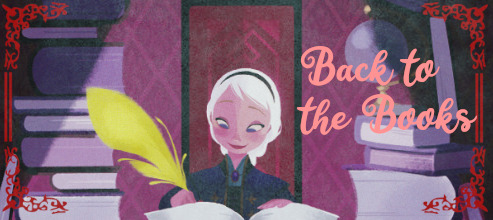
Revisiting all the Frozen Novels.
Over the past couple of weeks, I took it upon myself to re-read all of the Frozen Novels and chapter books. I had been meaning to revisit Dangerous Secrets, and then I thought to myself - "Why not revisit them all?!" So here we are.
Keep in mind that these are my personal opinions, and I encourage all of you to read the books for yourselves and give your own thoughts! Also, if you guys read any of these books, which ones were your faves and least faves? Let me know!
*Also, my audience scores are based off of Goodreads. Just in case if anyone was curious about that haha.
______________________________________________________________
Anna and Elsa: Sisterhood is the Strongest Magic
By: Erica David
Released: January 6th, 2015 - January 3rd, 2017
Type: Series
Age Range: 5 - 7 years
Audience Score: Average for whole series 4.9/5
My Score: 3.0/5
Anna and Elsa is an adorable series that tells of fun little adventures that the sisters have. A lot of the adventures seem a bit unoriginal, as the plot lines seem to be similar to that of the Disney Press picture books. I feel that the most original book of the series was Memory and Magic, as it dealt with something not put forward by any other books at the time. Due to its reading level, it might not be all that fun for older fans, but younger fans will more than likely love the stories. I find it a little silly that in book 3, A Warm Welcome, Anna and Elsa apparently don't know what a desert is, but regardless the series is honestly super cute. I also remember how everyone used to ship Queen Marisol and Elsa for a while - what good times haha.
______________________________________________________________
A Frozen Heart
By: Elizabeth Rudnick
Released: October 13, 2015
Type: Stand-Alone
Age Range: 10 - 14 years
Audience Score: 3.8/5
My Score: 2.5/5
This story was supposed to be the backstory for Hans that everyone was excited about. I was also really excited, as a Hans fan. The story is basically a retelling of Frozen through the perspectives of Hans and Anna. It gives us some of Hans' backstory, along with some scenes before the coronation. Rudnick herself is a good writer, and is great at really setting the overall tone and staying true to the characters. However, I feel that Hans' backstory was a bit predictable and cheesy, and Anna's side of the story didn't really offer anything substantial. The contradictions were also really jarring for me. ______________________________________________________________
Frozen Northern Lights: Journey to the Lights
By: Suzanne Francis
Released: July 5, 2016
Type: Stand-alone novel, but part of a Spinoff Series
Age Range: 8 - 12 years
Audience Score: 3.8/5
My Score: 3.0/5
Frozen Northern Lights was a spin off series that released this novel, an Adventure Notebook that works as a companion to the novel, 3 picture books, and a LEGO miniseries. I actually remember this spin off series being foreshadowed by A Year With Anna and Elsa, which was released March of the same year. I honestly thought that this was supposed to be Frozen 2, until we got the full background on the spinoff. The story follows the Frozen gang helping a Troll named Little Rock gain his tracking crystal while looking for Gran Pabbie during the Troll's Northern Lights festival. Overall, I thought this series was actually pretty good for what it was. I liked the idea of exploring more of the Trolls' culture while also teaching kids more about the Northern Lights.
______________________________________________________________
Conceal, Don't Feel: A Twisted Tale
By: Jen Calonita
Released: Oct 1, 2019
Type: Part of a series, but stand alone for the Frozen related story.
Age Range: 12 - 17 years
Audience Score: 3.8/5
My Score: 2.8/5
This story follows the original tale of Frozen; but, as the title says, a twist. In this alternate Frozen, Agnarr and Iduna choose to separate Anna and Elsa entirely, giving Anna away to one of Iduna's friends to keep her safe, and erasing both sister's memories of each other. Overall, the novel is written well and the characters were pretty true to their film counterparts. However, I found the set up doesn't really make much sense - I simply don't feel that Iduna and Agnarr would make Elsa forget her powers or give Anna away. That just seems nonsensical to me. I have to say though, it was interesting to see where the story was going and I actually, ahem, really liked the Helsa crack content. Don't kill me haha.
______________________________________________________________
Frozen 2: Forest of Shadows
By: Kamilla Benko
Released: October 4, 2019
Type: Stand-Alone
Age Range: 8 - 12
Audience Score: 4.1/5
My Score: 4.8/5
Honestly, I feel this is the best Frozen novel out there. Forest of Shadows tells a story that happens a few months before Frozen 2, and was meant to help set up Anna's dedication towards Arendelle and her questioning her self-worth. The novel follows the sisters trying to stop a strange sleep disease caused by a Nightmare Wolf. This book honestly strengthens the relationship that the sisters have for their parents, and even *lightly* has the sisters talk about the separation. Other than a few pacing issues and couple inconsistencies here and there (like...where did that ice bear go?), the novel is just fantastic and really does add to Frozen 2 as a whole.
______________________________________________________________
Frozen 2: Dangerous Secrets
By: Mari Mancusi
Released: November 3, 2020
Type: Stand-Alone
Age Range: 12 - 18
Audience Score: 4.4/5
My Score: 4.0/5
Dangerous Secrets explores Iduna and Agnarr's relationship before their marriage and how their love blossomed over the years. I wrote a review for this one late last year, not liking the book too much. However, I was told to give it another chance, and I have to say that I enjoyed it much more the second time, with my biases out of the way. I still strongly feel that there was not enough sensitivity and care put into Iduna's connection to the Northuldra, and if/how she chose to handle the discrimination towards her people as Queen. However, I can't deny that Mancusi delivers in giving Iduna and Agnarr fantastic chemistry, delivers in answering a lot of questions put forth by Frozen 2, and gives an amazing take on Iduna and Agnarr's heartbreaking feelings over the separation.
______________________________________________________________
#greatqueenanna/analysis#Frozen#Frozen 2#frozen books#Forest of Shadows#Dangerous Secrets#Frozen Nothern Lights#Journey to the Lights#A Frozen Heart#Anna and Elsa: Sisterhood is the Strongest Magic#Sisterhood is the Strongest Magic
50 notes
·
View notes
Text
Roundup: August 2021
This month: Jane Eyre, Wide Sargasso Sea, Don’t Call it a Cult, The Secret Garden, Showbiz Kids, Masters of the Universe: Revelation, Lucifer.
Reading Jane Eyre (Charlotte Bronte) - I’ve been meaning to read the Wide Sargasso Sea for a long, long time, but first I thought I’d revisit the source material. I find my opinion hasn’t much changed - I still love the prose, still love Jane as a character, and still find Rochester extremely unappealing. The section with Jane at school is the most engaging for me, and her early time as a governess at Thornfield, but as soon as Rochester shows up I just find him so irritating I have no idea why Jane loves him so much (other than he was the first man to ever show her a scrap of attention). I mean, I know to an extent - I've read the Takes, and part of fiction is accepting what you want for the character as a reader and what they want for themselves can be two different things, and that's not the fault of the text. I can be satisfied by the ending because Jane gets what she wants, I just can’t help but wonder about a Jane who was found by John Eyre before she went to Thornfield, or who took her inheritance and made her own way after Moor House. Byronic heroes just aren't my thing I guess ¯\_(ツ)_/¯ Wide Sargasso Sea (Jean Rhys) - The first Mrs Rochester of Jane Eyre strikes an uneasy tone to a modern reader; she does not utter a word in the novel, is depicted as animalistic and almost demonic, her story only told in a self-serving manner by Rochester, and conveniently disposed of so Jane can return to claim him. Rhys reimagines Bertha as Antoinette, a “white Creole” of Jamaica in a postcolonial take on the racial/social prejudices and hierarchy only hinted at in Eyre, where Bertha being Creole primarily an aspect of her Otherness, and in which Rochester describes himself as being desired as a husband because he was "of good race" . In Sea, although Antoinette is white (passing, perhaps), he sees her "not English or European either" and this contributes to his rejection of her (and perhaps his willingness to believe she is mad). The novel is surprisingly short - it skips over the meeting and courtship of Antoinette and Rochester (tellingly unnamed in the novel) entirely, jumping directly from her childhood/coming of age to the couple already married, and over much of Bertha's (renamed by Rochester) sad life in the attic. Still, there's a density to the writing, much is implied beyond the sparse use of words and recurring imagery - subjugation, reflection, and of course, fire - when freed slaves (Rhys changes the timeframe to after the passing of the Emancipation Act of 1833) set fire to Antoinette's family plantation, a pet parrot whose wings have been clipped by her English step-father Mason, cannot flee and falls to a fiery doom, in a grim omen of Bertha's fate. It did, however, leave me wanting more - I understand Rhys' stylistic choices and restraint, but in her effort to give voice to the voiceless, Antoinette/Bertha remains somewhat an enigma. Don’t Call it a Cult: Keith Raniere and the women of NXIVM (Sarah Berman) - I continue to be disturbed but intrigued by the NXIVM case, not only because of my abhorrence of MLMs/pyramid schemes, but my bafflement as to how this thoroughly unremarkable man was able to hold sway over so many women. My mild criticism of the two documentaries on this subject was that they tended to jump around in time so you never really got a good idea of what happened when. This book provides a well researched, detailed summary of events and linear chronology of Raniere’s perverse pathology reaching all the way back to childhood, and so is both an excellent supplement to the already informed, and broad overview to those new to the case. Berman is a Vancouver-based journalist who was present at Raniere’s trial and gives insight into witness testimony, supported by her own interviews and extensive research. There's less of a focus on the sensationalised celebrity members, with greater emphasis on the lesser known victims - including the three Mexican sisters who were all abused by Raniere, one of whom was kept confined to a room for years. It's difficult reading, consolation being the
knowledge that Raniere is rotting in prison and that his crimes finally caught up with him. Watching The Secret Garden (dir. Marc Munden) - Spoilers, if one needs a spoiler warning for a 110 year old novel. One of those stories that is adapted every generation, and generally I have no problem with this, since new adaptations can often bring something new or be a different take on old material (see Little Women 2019). But a part of me can’t help feel why bother with this when the perfect 1993 version exists. There is an Attempt at something new with this film, moving the setting forward to 1947 (Mary’s parents having died during the Partition), and turning the garden from a small walled secret to a mystical, huge wonderland full of ferns and flowers and endless sun. But in doing so, the central metaphor is lost - rather than Mary discovering something abandoned and run wild, gently bringing it back to life with love and care, she merely discovers a magical place that requires no effort on her part. There’s also less of a character arc for Mary, remaining unpleasant far into the proceedings, forcing Colin to visit the garden instead of it being his true wish, and generally succeeding by imposing her will on everyone else. In many ways she’s more like Burnett's other child heroine Sarah Crewe - the film opens I’m with her telling stories to her doll including Ramayana, which is eerily reminiscent of Alfonso Cuaron's (also perfect) 1995 adaptation of A Little Princess. But I suppose a sliver of credit where it's due - Julie Walters' Mrs Medlock is less of an antagonist, with Colin Firth's Lord Craven being Mary's primary obstacle. There's also a subplot with Mary's mother's depression following the death of her sister being the reason for her neglect (and Merlin alum Rupert Young shows up briefly as Mary's father) but like shifting the time period, there just doesn't seem to be a point to it. The climax of the film involves the Manor burning down (writer Jack Thorne stealing from Rebecca too, lol), with Mary and Craven have a very calm conversation as fire and smoke surrounds them. It’s all very bizarre, but also…rather dull? Don't bother with this, just watch the 1993 film again. Showbiz Kids (dir. Alex Winter) - a really interesting documentary on the titular subject - Winter was himself a child actor on Broadway before his film career kicked off in The Lost Boys and Bill and Ted, and has been able to assemble a broad range of interview subjects - Mara Wilson, Evan Rachel Wood, Wil Wheaton, Jada Pinkett Smith among others - former child actors, those still in the business, and some up and comers like Disney star Cameron Boyce (who I was sad to see in the coda has passed away). We also follow two young hopefuls - Marc, attending acting classes and auditioning in pilot season, yet to book a job but his parents are invested in "his" dream, and Demi, already established on Broadway but having to start to make choices between a career and a childhood. There's no voiceover, no expert opinions in this, letting the actors speak for themselves, but there is a telling juxtaposition of Marc returning home, jobless but having fun in the pool with his friends, while Demi has to cancel the summer camp she had been so looking forward to because she has booked a new role. The film is fairly even handed, but ultimately I took away that there just seems to be more harm than not in this industry, and abuses of many kinds. It does make you wonder about the ethics of child acting, at least in the current system where the cautionary tales are plentiful. Masters of the Universe: Revelation (episodes 1-5) - Mild spoilers I guess? I was never really into He-Man as a kid, other than the Secret of the Sword movie, so most of the in jokes and references in this went over my head. I have to admit, it was actually seeing all the outrage that made me want to check this out and see what all the complaining was about. I actually…really enjoyed it?!? I’m sympathetic to the complaints of a bait and switch (creators really need to learn to say
“just wait and see”), but other than that in my view the rest seemed completely unfounded. Adam/He-Man being killed in the first episode and the impact that has on Eternia and those left behind is actually a really interesting premise. This isn’t a TLJ situation; in contrast everyone (except Evil-Lyn) is always going on about how much they miss Adam, and the whole point of the first arc is him coming back. There’s also a nice little detail of Adam in Preternia (heroes heaven) choosing to remain as he is rather than as He-Man where all his predecessors have chosen their “ultimate” forms. I love him and his Magical Girl transformation. As for Teela - female characters can’t win, it seems. If they are perfect, they’re Mary Sues, if they have flaws, they’re unlikeable. Teela is Going Through things and is on a journey, but I often feel (and it seems the case here) that people confuse a character arc with author intent. No! Just because a character says/does something it doesn't mean you're supposed to agree with them! Some of Teela's actions may be petty and her demeanor less than sweet, but people make bad choices as a response to grief, and I actually thought her anger over Adam never telling her his secret and how that manifested was a pretty interesting take. I'll be interested to see the next half of the season, and ignore the ragebait youtube commentary. One more thing - Evil-Lyn (perfectly voiced by Lena Headey) was an absolute delight. Lucifer (season 5 part 2): They’ve basically given up on the procedural side of things by now and are leaning heavily into the mythology, which works for me since the case of the week is always the least interesting part of any show. It also struck me this season that there’s gender parity in the main cast (Lucifer, Amenadiel, Dan and then Chloe, Maze, Ella, Linda) - and actually, that’s more women than men. How often does that happen?!? I can’t say I’m particularly engaged with the Lucifer/Chloe pairing, but am happy to go along with it since that’s where the whole plot revolves. The best scenes for me this season were with God’s Dysfunctional Family, even if the lead up to the finale felt rushed (I understand the need to wrap things up in case of cancellation but still). I would have liked to see more of the sibling dynamics between the angels and less romantic drama, but hey. The character death got me, as well. I didn't see it coming and I didn't realise how much I had enjoyed that character until they were gone and well...it got me. I see the last season is coming soon, I'm not exactly sure where they can go from here, but looking forward to it nonetheless. Writing I was actually quite sick this month with a throat infection, so wasn't in the best frame of mind to get anything finished like I had planned to. I'm going to hold off posting the word count this month and roll it over to September when hopefully I've actually posted things.
6 notes
·
View notes
Note
Was re-watching some of season one, and I still can't believe there wasn't fallout from Dean's cancer lie. That it was just dropped like that. As a writer is there some kind of time limit these things need to be addressed before it loses steam? As much as I still want Beth to confront Dean about it, I'm not sure if it'll mean the same thing after all this time?
Okay, I owe you a huge apology, anon, because you sent this months ago and it’s currently the oldest non-prompt ask in my inbox, and the only reason I haven’t answered it yet is that it’s such a good question, and one that I wanted to answer thoughtfully and - - well fully - - for you. I hope you’re still around and that you still might want the answer. 😊
It is frustrating that the show hasn’t had any fallout from the cancer lie yet. I feel like it’s been on my wishlist for every season since s1, haha, and I’ve mentioned it before, but I’m actually less bothered by Beth not having confronted Dean on it than by the fact that the show hasn’t mentioned it at all. After all, I think it’s believable that Beth would have a hard time dealing with it – the way she found out about that lie is now intrinsically tied to Dean getting shot, and the guilt that would be associated with that (and that we saw in the early part of season 2) feels grounded and authentic to me.
That said, I don’t believe for a moment that Annie wouldn’t have brought it up, and for us to get scenes like, say – 2.05, where Annie and Ruby bore witness to the reveal of another Dean-shaped betrayal in the conversation with Amber – feels disingenuous and like a missed opportunity to me. I feel like the cancer lie should’ve hung heavy over that conversation.
But! That’s not your question! Your question is if I as a writer think there’s a time limit on addressing these sorts of narrative moments, which is such a good question, like I said, and I think is probably something that’s subjective to how people like conflict in a story, but for me, the short answer here is no, I don’t think there’s an expiry date on something like that.
A lot of that comes down to how I understand and enjoy conflict in storytelling; which of course invites quite a few caveats around narrative and weight and characters, so hey! Let’s break that down a bit.
Conflict & Narrative Weight
Conflict is, of course, the driving force of any story. It’s what pushes characters through narrative, forces hands and creates tension, and what that conflict looks like is different story to story, arc to arc. There’s a lot out there on different types of conflict, but I typically like to break it down into four categories which encompass most of those:
Character vs Other Character
Character vs Self
Character vs Society (structures and institutions)
Character vs Environment
Generally speaking, stories can use any amount of these any number of times, and Good Girls in particular thrives on all four. Each of the girls have their own types of conflicts in each area, but I’d say that generally speaking they each have the focus of Character vs Self, and then a different primary conflict otherwise.
In s1 for instance, I’d break it down a bit like this:

I think it varies season-to-season of course, but in s1 at least, I’d position Beth’s conflict beyond her conflict with herself as primarily being with Other Characters, Ruby with Society, and Annie with Environment.
That’s not to lessen these other conflicts, this is just to say that they’re weighted differently. And they should be! Good stories have different weighted conflicts, because having life threatening dilemmas like Dean cutting the plate interspersed with lighter conflict like Annie trying to steal the canary interspersed with Dean trying to make up a story about why the fish died for his daughters, is what creates dynamic storytelling that has a rhythm and feels full of light and shade.
Point is, while the girls each have conflicts in all four areas, they’re weighted differently for the three of them.
In s1, Ruby has conflict with other characters like Shirley and Mary Pat, but they’re typically short-lived with lower stakes compared to Beth’s with Dean, Rio, Turner and Mary Pat, and alternatively, neither Beth or Annie have the same high stakes societal conflict that Ruby has with battling the hospital for Sara’s treatment.
And again – Beth and Ruby’s homes might become a battleground occasionally, but it’s got nothing on the way many of the environments Annie operates in have been heavy conflict zones – from almost being raped in her home in 1.01, to Fine & Frugal being an insanely hostile setting for Annie across both S1 and S2, from the smaller moments i.e. Greg springing Annie to tell her he’s suing her for custody, to the more extreme – Boomer trying to coerce her into sex, Boomer planting drugs in her locker and getting her arrested, the bodies being stored in the cool room, Noah’s infiltration. These are extremely major conflicts positioned around Annie and her environment.
These conflicts are both major and minor, episodic and long-term, resolved and left to hang, temporarily or forever. The point of all of them though is they’re there to build story, character and tension, and how they’re weighted, generally speaking, depends on their purpose and the character focus.
Dean’s cancer lie was, in a lot of ways, a response to his already-existing conflict with Beth. It originally gave the appearance of a snowball effect, which is a writing technique that this show loves, haha. The problem is, that’s not what happened with the cancer lie storyline. We didn’t get the cathartic end where the snowball builds and builds and hits, instead it was interrupted, which affects audience expectations.
What we expected was this:

But instead we got this:

(Sorry for my terrible post-it note diagrams, haha)
Basically that articular conflict was usurped by Rio’s conflict with Beth, which cut the snowball effect off mid-roll.
We should’ve had our big, huge fight – that moment where the snowball has gained all it;s weight and hits – only it was stopped.
Which! Isn’t necessarily a bad thing.
Those dramatic stops of narrative arcs happen all the time, and many do it really well! Think of something like The Red Wedding in Game of Thrones, where the snowballing arc of Robb Stark’s rise was so suddenly stopped, and hell, I even think, in the moment, that cutting off Beth and Dean’s conflict for Rio’s dramatic re-entry into Beth’s life was extremely effective.
The difference is that the loss of Robb’s rise as a result of The Red Wedding was still weighted heavily, just not in the way we expected, and as a result was felt for the rest of the series (or at least, y’know, it was before the show completely fell apart, haha), whereas Good Girls seemed to bury the Beth and Dean conflict, and instead blanket it with a new layer of snow.
Beth got Dean shot.
That was the betrayal now, and that is what the first few episodes of season 2 gave weight to, and while that conflict evolved again, the cancer lie never quite got unburied.
Does that mean it never will?
Not necessarily at all, but to talk about that, I think I need to breakdown what I like to call Touchstone Conflicts and Landmine Conflicts.
Touchstone Conflicts
When I talk about touchstone conflicts, what I generally mean is the conflicts that are revisited frequently and come to be major parts of the character’s journey. These are the meat and potatoes of any story and what drives individual scenes as well as episodes and arcs and seasons.
Touchstone conflicts are conflicts Good Girls usually does really well. Think about how Ruby vs Society is revisited frequently through her troubles paying for Sara’s medication, then surgery, then different medication, and how that’s not only compounded with specialists, the hospital and the insurance company, but also her conflicts with Stan and Sara. The purpose of this is to keep Ruby’s motivation really present in our minds as an audience, but also to tease out Ruby (and later Stan’s) evolving sense of morality, which is pivotal to her conflict with herself.
Similarly with Ruby, I think she has the best touchstone conflict arc across the series in her worry around Stan finding out about what she’s doing in s1, him finding out in 1.10 (Oof at that particular snowball hitting), and then with him coming through for her in 2.01 before she gets her awesome ‘I’m that bitch’ speech in 2.02. It continues to be a touchstone conflict after that too, but I think it definitely peaks overall in there.
The thing about touchstone conflicts though is that they’re so regularly revisited that they become close to the surface and thus very present overall in the feel of the show which in turn means that they can be gateways to new conflicts and new scenarios. Annie’s conflict with herself and her own insecurities for instance are touched on so regularly in so many different ways, that when they build into conflicts with other characters – whether that be with Nancy, Beth or Ruby – it feels unavoidable in ways that are usually (although not always!) narratively satisfying.
With Beth and Dean, the cancer lie was a touchstone conflict in s1 along with Dean’s cheating, but while Dean’s cheating has now been a touchstone conflict across all three seasons, the cancer lie feels buried, as I said above, which can make it what I like to call a landmine conflict.
Landmine Conflict
Landmine conflicts are ones that are frequently established, left for a while – sometimes for chapters or entire series at a time – and then later explode. A lot of shows do this really well (and a lot really badly, haha) – Bojack Horseman, Breaking Bad and The Sopranos are three shows that jump to mind as being good with landmine conflict – but a lot of shows do try it to varying degrees of success, particularly as landmine conflict typically makes for a buzzier story / episode than touchstone does.
Because here’s the thing – where touchstone conflicts are about building towards greater conflict, landmines are about exploding conflict open.
Good Girls, to me, is a show that wants to be great at landmine conflict, and isn’t. And look, it’s no secret that I love the show, but I don’t think landmine conflicts have ever been its strong suit. I mean - - the loft scene in 2.13 was definitely An Attempt, haha, and I think Boomer’s ‘death’ in 2.03 which then exploded in 2.12 was a slightly more successful attempt, but not overall that satisfying.
The point of landmine conflict though, in my experience of them, is usually based around three things:
Marking a drastic shift in the narrative / character arcs / relationships
Contextualising or recontextualising prior scenes and character moments to give them new narrative weight; and
Shock value and hype.
I’m tired of talking about 2.13, so let’s talk about the Boomer’s Alive reveal instead.
As a landmine, this did all of those things, although how effective that was is of course up for interpretation. It did though mark a significant shift in the story in terms of how the girls were going to try and get out from under Turner’s thumb, and it had a huge impact on Annie’s sense of self and her relationship with Marion, which would see an end put to that touchstone conflict untill it was revisited gently in 3.08 with Marion’s death.
Yes, but what does this have to do with the cancer lie, Sophie?
Right! Sorry!
My point is that I do think the cancer lie would be an (uncharacteristically, haha) effective landmine conflict for this show if they weighted it appropriately, because you’re exactly right in your ask – bringing it up randomly now would not be satisfying, because it’s no longer a touchstone conflict in either Beth or Dean’s arcs. It’s not one that sits close to the surface – it’s buried deep – and that doesn’t mean that it can’t or shouldn’t be dug back up, but if it is, it needs to go off.
And at this point in the story, I think the only ways that that could effectively be done is in either:
A divorce
Beth forcing Dean’s hand in the midst of another conflict
In a major fight between Beth and either Ruby or Annie where it’s thrown in her face; or
Some combination of the above
We need to feel it at this point in the story if they are going to use it, because it’s been left so long dormant that to revisit it needs to be shocking, it needs to mark a drastic shift, like I said above, but most importantly, it needs to contextualise the two seasons it stayed buried.
It needs to give the silence around the lie weight.
If it doesn’t, it will feel lacklustre and it will feel like too-little, too-late. To so forcibly blanket what was a major touchstone conflict of season one – not just with the characters it involved directly, but the characters on the peripheral of that particular story too – doesn’t diffuse the storyline, and it shouldn’t. I think we can all still hear it ticking, and whether or not it goes off is up to the writers, of course, but I do hope they pull the pin, and I do hope we all feel the bang when they do.
#omg this got long#haha#beth boland#dean boland#gg season 1#dis/honesty#writing#kind of#gg season 4#beth x dean#staying's worse than leaving#welcome to my ama#nbc good girls#Anonymous
12 notes
·
View notes
Note
Hi
I hope you're doing well
I have questions if you don't mind
Who do like Axel von Fersen in Marie Antoinette or Axel von Fersen in 1789 les amants de la bastille and also do you like Marie Antoinette in Marie Antoinette or in 1789 les amants de la bastille
Thank you for answering my questions
Dear Anon,
I am doing well, thank you very much! I hope you too.
Hmmm, as a quick answer I would say I prefer both Marie and Fersen from ‘Toho MA’, but the full answer is slightly more complicated.
Firstly, it is almost unfair to compare them to each other because in MA they are the main characters, whereas in 1789 they are main-support or secondary-mains at best.
Secondly, MA has a far bigger focus on the characters because that is what drives the plot, while the opposite is true for 1789, which mainly sells a spectacle. I myself am more fan of subtle and deep story-telling rather than spectacular shows, so the MA versions of Marie and Fersen are more to my liking.
Thirdly, the quality of the characters also depends greatly on the cast. My first view of MA is the A-cast, and therefore my impression of the characters is that they are incredibly well written. After comparison with other casts however, I started to wonder whether it was just the A-cast being too good, and the musical itself being ‘fine’. (In short; I’m not fully sure how much I’d ‘clearly’ have preferred MA Marie and Fersen were it not for A-cast. Click here for a comparison between the two casts written by my friend @wildandwhirlingwords)
But, I shall go into more detail for both characters why MA’s version appeals more to me - someone who enjoys character writing most.
🌹Marie Antoinette🌹
M.A. 2018
In my opinion Marie Antoinette is better in MA because you see her journey and her motivations. We all know that the historical Queen screwed up majorly, but in MA we see why, and in what ways she indeed had very little other choice from her own perspective. She was a flawed foreign woman in a time and place where flawed foreign women were hated most.
In the beginning of the musical the King comes tell Marie that she’d have to live more economically. Marie is clearly not very enthusiastic to hear that, but she also never protests. She just asks ‘why’ and then accepts the answer - albeit broodingly. More importantly however: we need to keep in mind that despite being called Madam Deficit, the historical Marie Antoinette was actually quite economical at first because the Austrian court where she comes from was way less extravagant than the French. It was after her marriage into French royalty that she became more extravagant, because she was criticised for “not being a proper royal” by the French. According to the court, the 14 year old Marie was “a peasant unworthy of becoming Queen.” When you’re that young and criticised by your entire new life, you do everything in your power to make sure you can actually have a life; you adapt. So when Marie was then suddenly told to stop ‘adapting and be a proper Queen worthy of the French”, we can see why more is at stake than “Karen needs to deal with only 10 dresses a week.”
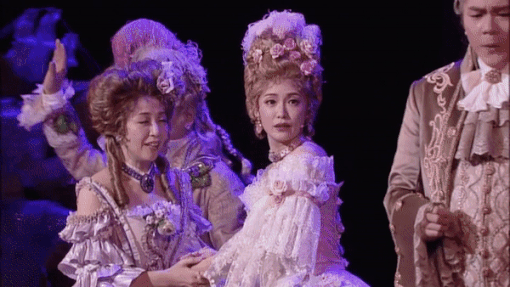
Something else that adds depth to her character as opposed to her 1789 counterpart is that as the story progresses, Marie actually grows. She becomes more mature and more serious, and you see in her how all the events have a clear toll on her. From her own perspective, she really was trying very hard, but anything she tried was inadequate to improve the situation. What she didn’t know is that no matter how hard she tried, the situation was already un-salvageable before she was even born. The populace AND the court had already decided to hate her for being an unintelligent foreign woman from an enemy state, after all. This is an insight most historians nowadays agree on.
In a later scene where Margrid confronts Marie, she asks the Queen: “what makes you think you are better than us?” Marie confirms nor denies, but replies: “I am merely Queen as I was appointed by God.” When she adds: “All I know is duties, you are free,” there is also a clear sense she genuinely doesn’t know why she was appointed by God, but as she is now, all she can do is her best. She is still ignorant, which was a genuine problem about her. She does not know the hardships of not being from the top rank, allowing her say something as insensitive as: “at least you’re free.” But again, despite her ignorance, her feelings are sincere. From all the unfair expectations she was made to live up to from age 14, you really do see why ‘a life without duties’ seemed so much more appealing to her.
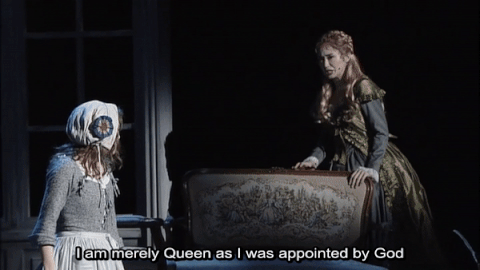
1789 - The Lovers of the Bastille
Marie in 1789 is more of a side-character, and the musical itself just is not very character/story driven as MA is. 1789 has the tendency to take the tropiest of tropes and stay on surface level with the characters. Ouki Kaname is an incredibly good actress and she tries her best; but she cannot do more than the script gives her to work with.
In this musical Marie is not portrayed in a very relatable or sympathetic light. She is extravagant because she has escapist fantasies, but we don’t really see what she’s escaping from. The sympathy from the audience is supposed to be drawn from the tragedy that she’s married to the King but is in love with Fersen. Oh, and she has a son but he’s mortally ill. Meanwhile however, you don’t see how her life is so bad she needs to escape... and you also don’t see Marie really being worried about her son than an occasional: “Oh Ill again? Sucks I guess. Gotta cry my eyes out on my lover’s lap, AHHH FERSEN 💗” It was not until her son had already died that Marie woke up, but the lack of portrayal of Marie’s perspective and the pacing really makes one legitimately wonder whether the child did not just die of Marie’s neglect. And about the forbidden love ...we’ve seen enough love triangles with star-crossed-lovers... I don’t know about you guys, but I am numbbbbb to this “problem”.
When Marie receives message from Olympe that she finally gets to meet her lover after a long separation at the Palais Royal, one of the first things she says is: “is that not the place where revolutionaries and prostitutes are gathered?” This immediately sets up an empathy-barrier between her and the common people. This Marie clearly views herself too good for people who do anything to get by; why would you care about her then? Because Marie’s story is not fleshed out you don’t see parts that can make you go: “oh, the revolutionaries really hate her for reasons beyond her control, she is in danger.” Or “she was raised by a puritan society, making her hate on sex-workers; that’s part of her character flaw.” Instead it’s just this Diva being quite judgemental.
Ouki was trying very hard to make the focus about her own safety, but with the script being what it is... she’s still a mostly unsympathetic character who is a martyr of forbidden love.
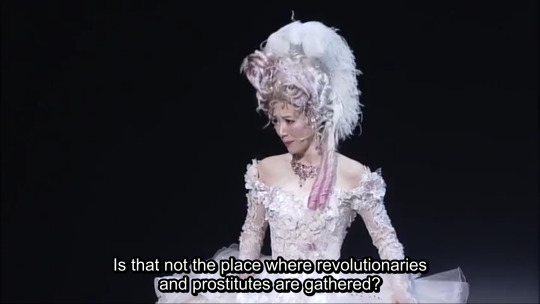
There is one scene where we see her take on a much more mature and responsible role. That was the first time I personally felt like Marie from 1789 is an actual human being with feelings and personal difficulties. But in great part this is Ouki’s acting... (the other cast didn’t do much for me). What is also important is that Marie was ‘humbled’ because her son died. Marie did not have much of a personal growth, and then she changes to a more sympathetic person because of an external factor just... feels less earned.

In the finale Marie appears again in her execution clothes, and the way Ouki appeared really felt like a punch in the gut. She sings “as a recompense for our griefs, people have learnt forgiveness.” However, the story skimped over the characters so much I was left to wonder: “who learned to forgive whom?” Do you think the people forgave you? Or was there somebody you hated but now learned to forgive? What was your grudge? Do you understand the angry mob’s grudge?
The finale of the musical treats like after the heroic sacrifice of the protagonist (Ronan) the oppressive monarchy was replaced by a good democracy, and a Reign of Terror will DEFINITELY not happen under Robespierre or something. But if you’ve had a BIT of European history you just know it’s a blatant lie. So the finale just feels too simplistic, and this simplistic feeling was in part presented by Marie’s very empty, lip-service-y line.

⚔️Hans Axel von Fersen⚔️
M.A. 2018
Fersen is a bit harder to compare which version is better, because honestly, depending on who plays Fersen in MA, Fersen is either the most generic Hollywood sweeping-lover-hero, or a diamond mine to excavate. In the same post linked above by my friend, she explains in detail the differences between TashiroFersen and FurukawaFersen. K-musical fans, don’t @ me, but from what I can tell, the Korean Fersens are also very... typical.
In this post I have discussed Furukawa’s Fersen in great detail, so I shall skip over these for this post. But to summarise, when portrayed by Furukawa at least, Fersen in MA is very nuanced and restrained. Even if we do not fully credit Furukawa however, then at the very least the script allows enough space and material for an actor to flesh him out so phenomenally well (I think Tashiro and some other actors just.... really missed out on the potential).
Fersen in MA incredibly memorable because the main atmosphere of the imminent doom awaiting everyone is carried by him in a way nobody else does. The moment Fersen enters you feel the tension that the musical wishes to tell. Fersen has seen revolutions, he’s seen the power of anger; he knows shit is going to hit the fan because he’s familiar with this trajectory.
Fersen has excellent self control because he knows how a lack thereof would hurt Marie’s reputation and escalate the growing chaos. You can see very clearly how Fersen does want the intimacy, but to him duty and the grander picture has priority. In all the small actions from Fersen you see how he is a savvy intellectual through and through. (More about reservation later).
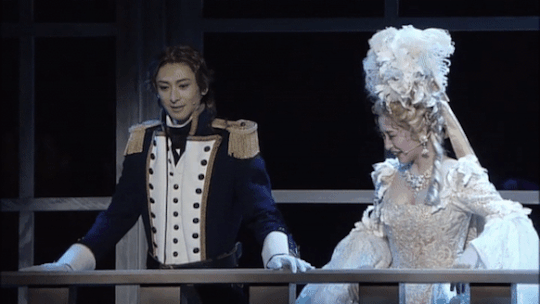
In contrast to 1789, we also get to see so much more of Fersen in MA because he is the narrator and a main character. Throughout the musical he’s been trying to de-escalate the chaos and even though his plans were actually well thought-out, the problems were just simply too big for any one person to solve. When Fersen mourns Marie there is a clear sense that he is not really surprised, just really upset that things had to come so far. Instead of singing something accusatory to the angry and hungry people, he sings: “fate, why did you give her everything, only to show her hell in the end?” Fersen truly understands why the people were duly angry, but that not taking away his sorrow of losing Marie who he knows is a better person than people make her out to be.

Also in great contrast to 1789, the finale of MA is rather grim. It does not suggest hope or that all problems will eventually disappear. The story for these people have ended, but the problems and the world will continue to our days, and days far beyond ours. It gives a feeling that the world of MA is so extensive that we - the audience - are part of it. In the finale when we see Fersen again, he also stays in tune with this feeling. “How can the problems of the world be solved, what is true justice? We remain clueless” he sings, and the way he looks into the unknown distance is almost a reminder to us that nobody has reason to stop worrying and fight for justice.
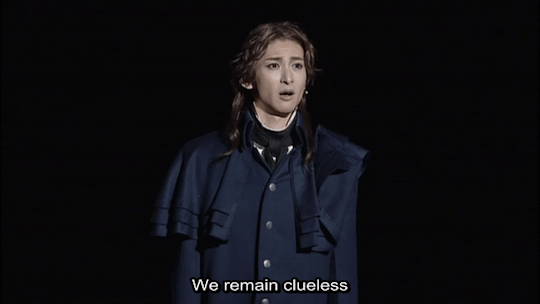
1789 - the Lovers of the Bastille
Now if we were to compare MA’s Furu Fersen to 1789′s Fersen, we see a stark contrast between the two. Where Furusen was incredibly reserved and hyper aware of everything, 1789′s Fersen is just the over-romantic lover who had been pining for his love. For a moment Marie realises she probably should not be cheating on her husband and backs away. Fersen however, is the one to make further advances, actively pulling her back to his side.

When he embraces Marie you see how he is just dreaming and indulging, something Furusen would never do. Furusen might hug Marie, but not without sh*tting 50 colours. 1789′s Fersen is the sweeping Romeo that most of history makes him to be, and little more. But again, Fersen plays but a very small role in 1789, so it is also unfair to compare him to MA’s Fersen.
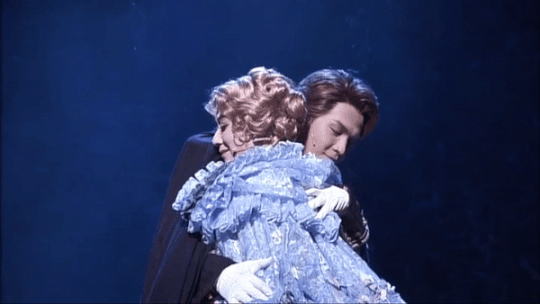
Regardless of whatever nuance might or might not be there however, it is also just quite hard to like this Fersen because he is ‘just another privileged aristocrat who is just needy’. When making out with Marie in Palais Royale they find out that Ronan fell asleep there drunk. Ronan simply complained that Marie was too loud and woke him, and Fersen immediately shuts him up, and then draws his sword at him for ‘speaking rudely’.
First of all Fersen and Marie, if you’re gonna do a clandestine meeting, you CHECK your surroundings. Second of all, FERSEN Ò.Ó, this peasant is untrained and weaponless; you can’t just unleash your high-ranking martial arts at him with a shiny sword. This is EXACTLY the reason the revolution happened; the people were sick of the suppression of the powerless by the powerful. UGHUM. It truly is mind-blowing to consider how 1789 Fersen and MA Fersen are both...Fersens.
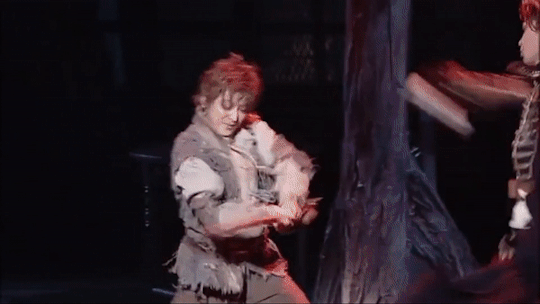
This Fersen is not very involved with the revolution from either side. He just proposes to help Marie and the King escape once, but got dismissed immediately. The following time we see him it is in the finale.
There he stands, a knight in shiny armour singing a really hopeful phrase to a relatively upbeat and hopeful music: “do not rely on force, but seek for hope and courage.” Here again unlike with MA’s Fersen, you don’t really feel like this Fersen has experienced anything. It was like he was an employed special guard, told by his boss there’s nothing he needed to do, his boss is dead, and oh wellll, moving on!

Conclusion
Because Marie and Fersen in MA are main characters whose stories are fleshed out, it really is very unfair to compare them to their 1789′s counterparts in a race of ‘who is better’. In the end of the day, 1789′s aim is to sell a spectacle, and it realllly is a phenomenal piece if you’re there for the spectacle. The choreography, songs, stage, everything is masterpiece-level. So if you’re there for the spectacle you get exactly what you went there for. The story and characters however... not so much. If one is more drawn to a direct, glittery spectacle with hands-down-amazing-songs however, they’d probably find Marie and Fersen from 1789 more enjoyable. If you’re into first and impressive impressions, the MA counterparts might demand a BIT too much attention and patience to get into.

Related posts:
Introduction and character analysis Fersen ‘MA’ 2018
Comparative commentary on MA Cast M and Cast A
#Marie Antoinette#Hans Axel von Fersen#Fersen#MA#1789#comparative commentary#TOHO#musical#1789 les amants de la bastille
32 notes
·
View notes
Text
PROCESS, ONE: A READER’S JOURNEY
“The essays in this book were memoir until they couldn’t stand to be memoir anymore.” —Leslie Jamison
Had I read that quote even only six months ago (the book to which she refers is her much-lauded personal essay collection The Empathy Exams), I wouldn’t have known exactly what it meant.
How can a piece of writing evolve from memoir? In terms of simple, unvarnished truth-telling, I thought the memoir, as a genre of literature, was pretty much the vessel. Yet here a case is being made for something that sounds like the opposite: it seems one can go beyond even the once terminally-regarded memoir.
Let me think about this further, about my confusion. Maybe my framing is off. Maybe it’s not an issue of evolution or reduction. It’s not that the personal essay is somehow purer than the memoir, as far as autobiographical writing is concerned. The issue is not one of authenticity. It’s about application, or even misapplication, that the quest for truth for which one naturally uses the data of one’s own life could, depending on the circumstances, be more appropriately undertaken in a different genre. The two genres are merely looking at different subject matter. They’re examining completely different lifeforms on the slides, but they’re using the same authentic microscope, as it were.
I relate to the sense of frustration in the Jamison quote, that there’s a feeling that the mission she started out on—writing a memoir—became so inadequate for the real task at hand that it became unbearable, that the pressure of working under a false guise gave way to a different form of transmission.
The memoir became a personal essay collection. It had to. The questions she was exploring could not be undertaken by simply telling the story of one’s own life. Personal data was necessary for the full picture. But she needed other sources, the experiences of others, the realities of phenomena outside of her normal experience, even as they were phenomena that ultimately she ended up relating to in a deeply intimate manner. In her collection, she let us into those experiences, and then we were able to relate, by dint of her fearless storytelling and personal excavations.
Now I’m getting it: a personal essay is fixed on some question and that is what drives the exploration. Personal, say, autobiographical, details are needed for the exploration, and this can vary depending on the subject. But the focus is the external question. That is the different lifeform on the slide. It’s about the question being pursued.
I.
But first, a look at where I started on this journey, with the memoir itself.
The memoir as a work of literature was my singular focus while I was crafting my book proposal a couple of years ago. Simply put, it was what was on the table. Owing to my provenance as a musician and an actor, and my express interest in writing about my life, the genre of the memoir naturally became a thing for me.
So I dove into acquainting myself, not with examples of celebrity memoirs or memoirs by politicians—perhaps the two most popular varieties—but with examples of the finer possibilities in those genres which—big surprise—happen to be written for the most part by writers. I found myself falling in love with the exercise of memoir writing, as opposed to, say, the gratuitous voyeurism that is often offered by the popular variants of the genre.
For me, what became valuable was the quality of the writing; most of the time I was reading the life stories of people with whose work I had, outside of the memoir being read, little to no familiarity. These windows into life were captivating in their own right, these portals into raw experience, the possibilities of narration within the genre of nonfiction, the enlightened self-awareness made evident in sculpting large-scale timelines of one’s own life.
----------------------------------
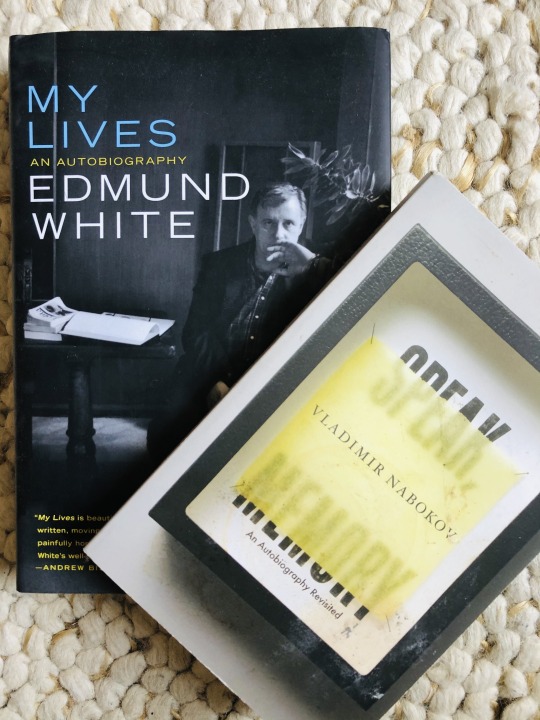
It’s difficult for me to overstate the degree to which these two books have influenced me thus far.
Nabokov’s memoir is well-known. It’s a work of literature in its own right. It is a great example of the possibilities of the memoir to accomplish something other than realism: the whole thing is a kind of Proustian meta-narrative of his childhood and abrupt departure from Russia after the revolution, like a dream of family life written down. Mary Karr, in The Art of Memoir, heads her chapter on this book, “Don’t Try This at Home: The Seductive, Narcissistic Count.” Indeed, the book reads somewhat Transylvanianly, a bold, exotic yarn full of strange characters unfurled for an audience unfamiliar with that way of life. It reads as alluring and dark, and, yes, quite vampiric. But it is also profound and gorgeous.
While it’s not really a memoir, more of an autobiography, and also not often regarded as exemplary of the form, My Lives, written by Edmund White is an incredible tour de force of portraiture of the most important people in his life, his therapists, his parents, his lovers, his friends, his subjects, they all get a chapter dedicated specifically to them. Imagine knowing a world-renowned painter who decides he wants to do a string of portraits of the most important people in his life and you are one of them. That’s what this is, in literary form. It’s less a story of him than of these people, but, by the end of the book, you, of course, end up knowing a lot about him. His ability to make you see the things that he is looking at, in a very concrete, physical way—the curves of a body, the angles of a face, the ambience of a train station—is unparalleled in my view.
Is there a difference between an (a) autobiography and a (b) memoir?
I think the difference is about scope. The autobiography is explicitly a functional genre that attempts to document a person’s entire life. It is a biography that is written by the person whose life is being written about. It does not usually try to invoke any literary devices and is intended to serve as an ancillary to consumption of the subject’s work outside of the autobiography. It is a kind of “reader” of the subject’s life. It’s main purpose is not to be written well (although if it isn’t it is a grave mistake), it is to convey the near entirety of the subject’s experience on earth.
By contrast, good writing is a bit more called-for in the memoir; otherwise the whole premise falls apart. The memoir, in carving out a specific “slice” of a person, either a period of time or some type of encounter or some activity that they always do, is explicitly intended to amplify and interrogate aspects of being. In this way, the memoir has more potential for inspiration and edification irrespective of the reader’s interest in the subject’s life outside of the memoir. This, to me, is the crucial difference.
For the most part, I am not explicitly a huge fan of the work of the writers below. But their memoirs have touched and inspired me. I don’t think I would have all that much interest in reading the autobiography of, say, Joan Didion. (I might, I can’t be sure, of course). But my point is that I’m not looking for her autobiography, whereas there’re a lot of Didion fans out there that would be waiting for said autobiography.
In this way, autobiography is a kind of fan service, whereas the memoir is a thing unto itself. It is a work of literature written for the purpose of refracting aspects of being alive. To appreciate that type of writing you need not be familiar with anything else that person has done on this planet, anymore than that it is necessary to be familiar with Herman Melville’s entire oeuvre in order to love and appreciate Moby Dick.
It was with the consciousness of the memoir’s self-sufficiency, the irony of its ability to communicate, in its more specific mode, even more broadly than the supposedly more capacious autobiography, that I continued my exploration of the genre and began taking notes for the writing of my own memoir (which is now a personal essay collection, but more on that later).
----------------------------------
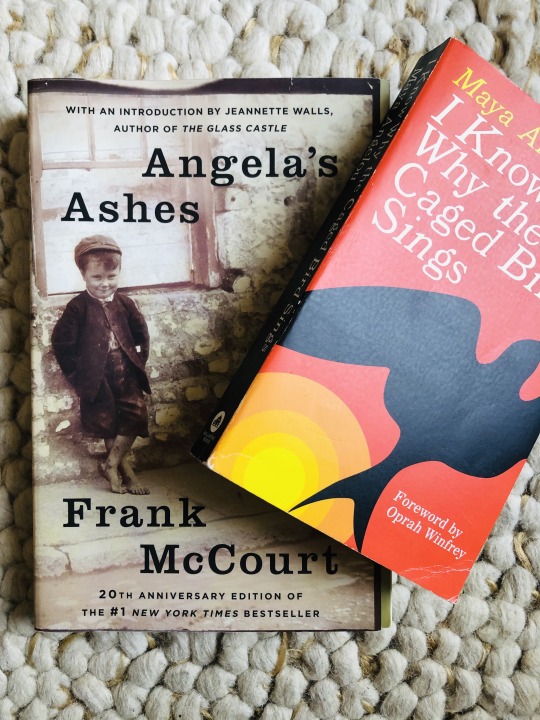
Two classics of the genre, here.
Many of us have read Maya Angelou’s book in high school. Both focus on the same thing: a period of time starting from birth and leading just up to late adolescence. Both are written like traditional first-person stories with beginnings, middles, and ends, and, were it not for our knowledge of their source material, might easily pass as romans a clef. I also think that both are examples of “misery lit,” although I think that that genre is overly hip and reductive for Angelou’s work, which is about so much more than just her misery. But they both focus on their childhood traumas in such a plain, unadorned, simple way, it is shocking and, for those of us struggling with these same issues, healing.
----------------------------------
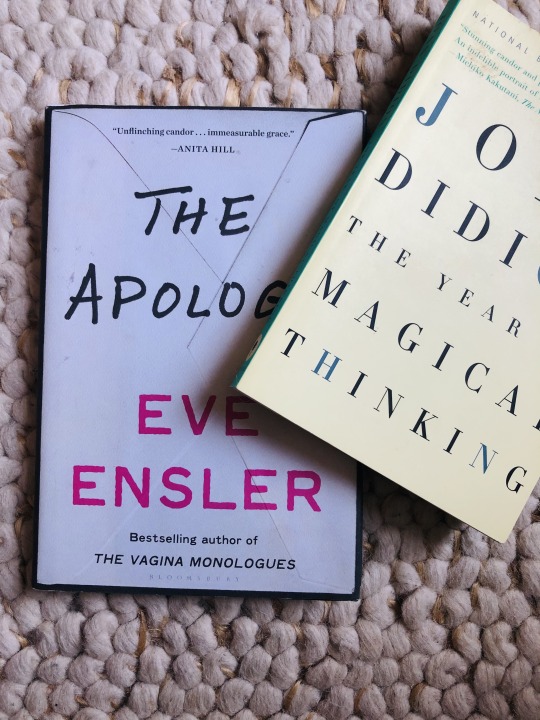
The Apology and The Year of Magical Thinking are examples of how the memoir can focus to a degree of incredible specificity. Both focus on pain but are concerned with different parts of experience. Didion writes only about one year of her life, while Ensler writes about almost the entirety of it, but with a focus on a single, prevailing experience. Both are harrowing in completely different ways and both are exquisite in the way they lift up their struggles to find meaning and truth, things that pertain to the reader’s own experiences and which he or she may also come into touch with in reading these books. They truly are gifts in that regard.
In a manner of speaking, these two books are like two, very long, book-length personal essays. They rigorously explore and interrogate their premises and do their best to extract whatever possible that is meaningful out of that exploration.
----------------------------------
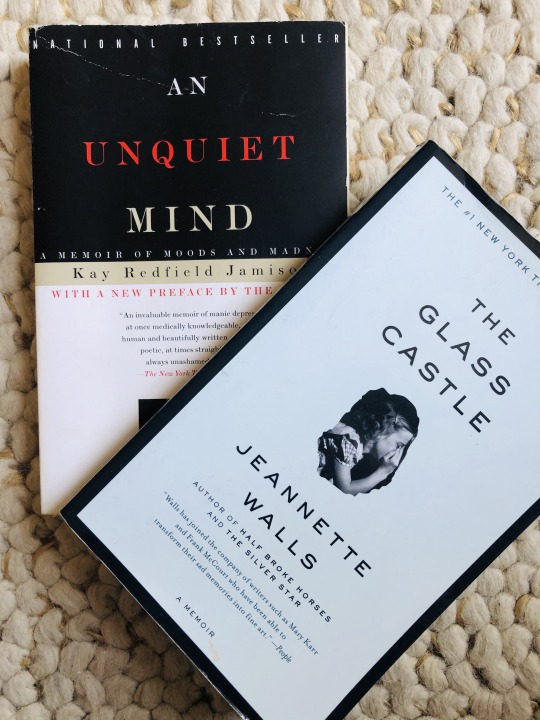
More “misery lit”! I actually don’t mean to be reductive in saying that. Both of these are fabulous stories concerning completely different encounters with mental illness and they are far beyond some hipster term of art. But there is a lot of memoir writing out there that explores the darker ways some of us were brought up and I don’t think there’s anything wrong with simply naming a certain type of writing that courageously explores how our childhoods might have been compromised.
In The Glass Castle it’s about her father’s mental illness and in An Unquiet Mind, it’s about the author’s own journey discovering and treating her bipolar disorder. Walls writes her story very much like it’s a novel, like Angelou’s memoir, and, also like Angelou, she writes it from the perspective of her child self and it is a compelling account as a result, full of tragic innocence and complicated encounters far beyond the reach of a child to properly grapple with.
Jamison’s book is very clinical, although she recounts her episodes frankly and shockingly and really brings you in to her subjective experience of insanity. These two books—not to mention Eve Ensler’s—have given me the courage to begin exploring my own encounters with mental illness and childhood trauma and to commit those experiences to writing.
----------------------------------
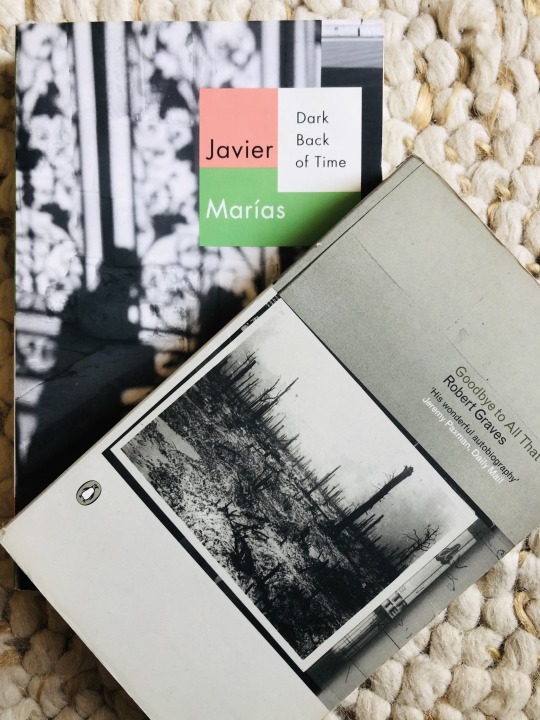
As I continued to research I started coming upon a very interesting type of memoir, the experimental memoir. That’s really interesting I thought. How does one write a memoir as a form of experimental art?
Not that this one is expressly experimental, but Robert Graves’ book is slightly off-putting in that fecund, experimental way: the bulk of it is dedicated to his experience in the trenches and it’s told with grit and harsh realism. But it starts with his schooldays and ends briefly, and curiously inconclusively, with scenes of fatherhood and tutelage. It’s a rather unique rendering of a life. Towards the end he admits that his original idea was to use the notes that he took on the frontlines for writing a novel but changed his mind after realizing that he would be desecrating his experiences and his memories and his sacrifices by layering a plot and storyline onto them. He then decided to write it simply as a factual account.
Dark Back of Time, however, is a full-on experiment in autobiography and it is always slipping in and out of reality, imagination and historicization. He spends a large amount of time writing about an old soldier who died accidentally on a hotel balcony in South America but he gets to this through talking about the reactions that his peers in Oxford had to one of his novels which they suspected made use of their lives. Truly an eye-opening experience to read autobiographical material refracted in this way.
----------------------------------
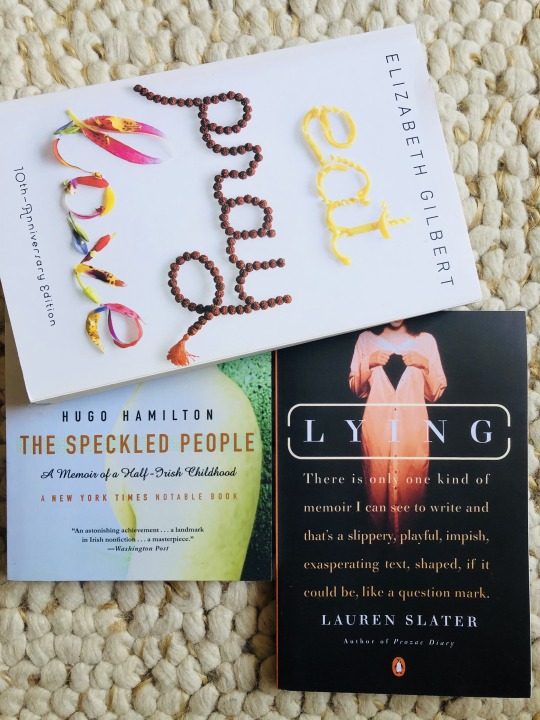
I haven’t read these three yet. They are “on deck,” as it were. Eat, Pray, Love needs little introduction, obviously. The Speckled People was highly recommended by a fellow writer and Lying came up in an online search as a prominent example of the experimental memoir.
At this point, it was already clear to me that I was writing a different kind of memoir than any of these examples. I realized that I was in effect writing personal essays without knowing it. I knew very early on that I wanted to eschew responsibility for an overarching narrative of any sort. I wanted to commit myself to specific topics that could be covered discretely in one chapter each. When I read the Graves’ passage regarding the desecration of his time on the battlefield, I thought of my own “war stories” and thought similarly that trying to give them a plot, while not exactly a “desecration,” would feel unnatural and inauthentic. What was feeling natural was to pick separate experiences in my life and devote a chapter to those I felt were strong enough for further elucidation. The time I got stuck on a mountain overnight with a friend. The shock of coming to NYU. The decision to leave the music industry. There were so many other parts of my life that seemed to deserve specific treatment in this way. I naturally started coming upon essay collections as a result.
II.
I took an online course by Alexander Chee called, “How to Write an Essay Collection” and afterwards it became much clearer what kind of book I wanted to write. I read about half of his reading list for the class and, along with the volumes I’d already dug into, I learned what a personal essay really was and what it wasn’t, and knowing this difference demonstrated to me quite clearly that the book I was writing wanted to be an essay collection in the truest sense of what an essay really is. The Leslie Jamison quote at the top of this blog post became true for me as well. My memoir could no longer stand being a memoir and had become a personal essay collection.
During the class, Alexander Chee recounted an irony regarding his own personal essay collection. He said that he found it curious when readers of his book would tell him that they found so much of him in it. “There’s actually not very much of me at all,” he said; and he mentioned this in order to illustrate what a personal essay collection is and what it isn’t. The reason why there’s not that much “of him” in his essay collection, nor, for that matter, why there isn’t much of any author’s life in any of their personal essay collections, is that a personal essay, despite being “personal,” is primarily geared towards externals not internals. “Pity the personal essayist,” the author Sloane Crosley writes in her New York Times review of Jamison’s latest essay collection, Make it Scream, Make it Burn, “fated to play with a reader’s tolerance for that most cursed of vowels. Too many “I”s and you’re self-absorbed; too few and: Where are you in this piece?”
Self-absorption as a liability in writing is understood enough, though, when it comes to autobiographies and memoirs, the liability becomes unavoidable and, if anything, necessary. We read those books exactly for the purpose of the big drop into an author’s psyche, willingly diving down the subjective abyss, basically swimming in “I”s (the best ones allow us to do this gleefully).
Not so in a personal essay, where the restriction on egoistic license holds. And yet: how do we include and implicate ourselves into the topic? without stepping on traps of self-absorption? This is what Chee was talking about when he said that there wasn’t much of him in his essays: not that he didn’t implicate himself in his narrations—he very much did—but that he skillfully observed this precarious balance.
That balance is undertaken quite differently depending on the author (and in my synopses of the collections I’ve read recently I’ll try to speak about how they’ve assigned “percentages of self” into their essays, what the “lean-to-fat" ratio is, for example, when “fat” could be understood as the strictly autobiographical portion of the essay). It can also vary according to the essay. In some cases it’ll be necessary to fully implicate oneself. In others, perhaps only a passing mention of the author’s impression of the events is needed. But there’s an essential aspect to what makes for a great personal essay, irrespective of ratios of personal to objective, that Charle’s D’Ambrosio captures beautifully in the introduction to his own essay collection:
My instinctive and entirely private ambition was to capture the conflicted mind in motion, or, to borrow a phrase from Cioran, to represent failure on the move, so leaving a certain wrongness on the page was OK by me. The inevitable errors and imperfections made the trouble I encountered tactile, bringing the texture of experience into the story in a way that being cautiously right never could.
This is kind of a Copernican revolution to me. I mean, it had never really occurred to me that you could be wrong and that would be a good thing. In writing I had always striven to make sure that I didn’t insult researchers, journalists, experts and scholars by misrepresenting the truth. Yet, here was basically a license to get it all wrong and admit it on the page and have that be a virtue of the writing.
What this tells me is that what remains key in the personal essay is not some authoritative stance, but the very uncertainty of the perspective, and how that might invite opportunities for a much more intimate relational structure with the topic matter on the part of the reader. This isn’t about ingestion (of data, of info, of ideas, etc.) but about contact. I see that as being very similar to the relationship between reader and author in a memoir, this premium on relation. The only difference—and for me, a very consequential one—is that the primary target of a personal essay’s sight is not the self qua self, but some implication with the content of reality on the part of the self. That intersection is what fascinates me more at this time than simple self-narration.
In this way, a personal essay can kind of be like a stop sign, a signal to halt the gyrating (mostly online) world, with its hyperlinks and ads and other pseudo-references. In fact, in his brilliant collection Proxies, Brian Blanchfield takes on this very task and turns the internet off when writing each of his essays in the collections. In order to take solace within the much more subjective account housed within the pages, an account at once open and tentative, based as it is in doubt, and hermetically sealed, shunning the greater world’s insistence on certification and realism, the essay becomes a prismatic utility for investigation, where perspective and subjectivity are king and certainty and objectivity are actually limiting.
The memoir offers something very direct to the reader: the author’s own struggle with, or journey through, some issue or period in life. The author is the chief protagonist in the drama, the star of, say, the cinematic adaptation of the book. The issues swirl around the protagonist but the camera stays trained on him or her. What I started to notice was that my mental gaze was always scudding away from the protagonist (me) and over to what else was in the frame. And so the personal essay as I began to learn about it became a much more appropriate vessel for these concerns, even as I knew that I would need to implicate myself in the action, keep myself in the frame. Striking that balance in a way that is both specific to me and my experiences and yet observant of the proper limits of the genre, so as not to veer away and “regress” back into memoir, has become my chief objective with each of the essays that I’ve been writing.
----------------------------------
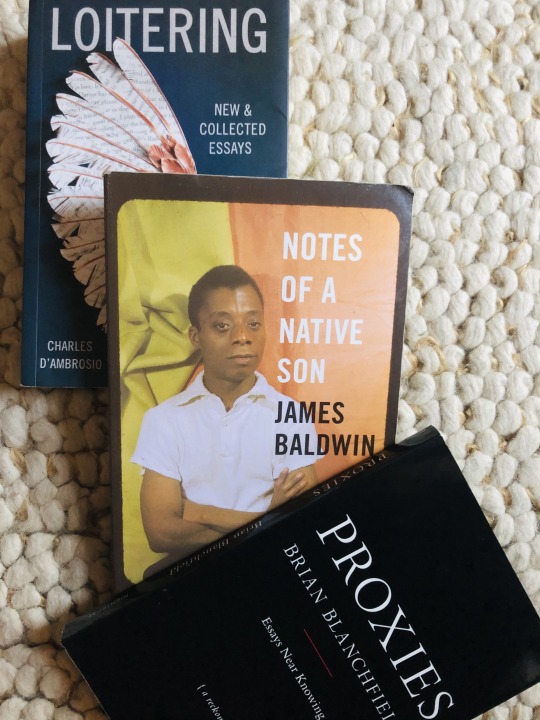
These three collections might be my bible for this project. Each are very different in style and application, but each is similar in that joyous experience of reading a paragraph and being so stunned by the insight that one has to turn the face away from the page for a moment (or two) to let it sink in. Baldwin is, of course, the king of this sort of thing. There were times while reading his essays when I actually had to straight up close the book and put it down in order to absorb what was going on. The title essay which is about Harlem, his father, and his early awakening to the depth of his country’s racism, is perfection on both the level of content and form. It does what an essay does best: leave you with the unequivocal residue of human feeling twisting around the grander issues with which that essay is concerned.
Each essay, in all of these volumes, is like a discrete nugget, a piece of writing, contiguous, open and alive, that can be read and reread, like an oracle you visit throughout your life, which, using the same words, speaks to you anew each time.
Ambrosio’s essays are absolutely nimble and virtuosic; his language is muscular and sinewy; his sentences are lean and long and you can ride them effortlessly and when you finish them and their paragraphs, you are left with an image of a truth that was planted in your sight without you knowing. It’s an exhilarating experience.
Blanchfield’s essays are a revelation of subjectivity. This volume was part of Chee’s reading list and I can’t express enough gratitude for having been directed to it. Perhaps Blanchfield is the master of nesting the autobiography within the confines of an essay. When he toggles between the external and the internal, you don’t notice it. It’s effortless. His ability to tell a giant story in one paragraph is inspiring. The tone and delivery is somewhat sacral, he’s a poet, after all. But it is also delicate, graceful, poised and elegant. And deeply personal. How someone can title an essay “On Frottage” and turn the reader’s attention to the true significance of the topic—AIDS and the gay scene in the 80s and 90s—and all of the social significance intertwined in it, along with implicating himself in a nakedly autobiographical way, is beyond me, but I am happy to be in the audience for it.
----------------------------------
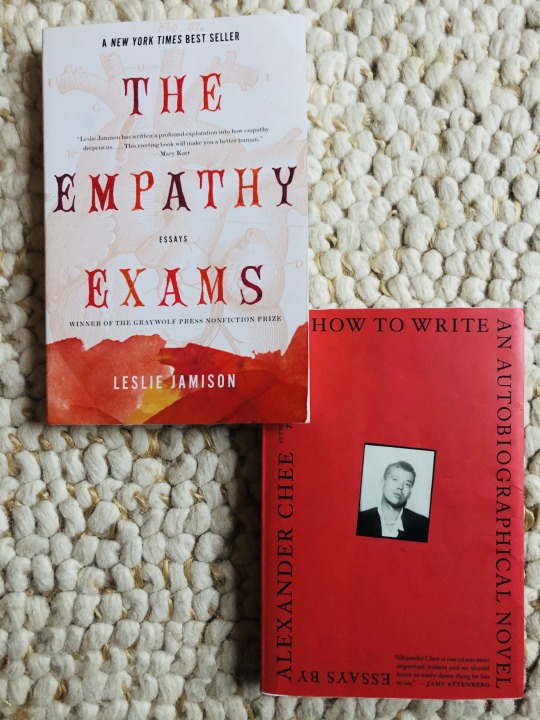
What I love about these two collections are their stealth and form. Their stealth comes from how they read, not so much as casually but as without artifice or adornment, and how this aspect lets the reader’s guard down, only to have some extremely penetrating conclusion arrive at the end of each essay, in a manner that the more plainspoken style did not necessarily anticipate. Chee’s prose particularly comes across as either supremely and dryly witty or as modest plainness, but when you finish one of his essays the takeaway is anything but those things; it is profound. Jamison as well. As for their form, they tend to do some adventurous things. One of Jamison’s essays uses a kind of diagram of storytelling which she learned in a writing class to “tell the story” of a traumatic episode involving a horrific episode of violence she experienced in South America. The essay is called “The Morphology of a Hit.” It’s a perfect example of something else that I really love about personal essays which is their ability to take leaps in form when that form enables a type of storytelling that otherwise isn’t possible. Chee does this very thing in a somewhat humorous essay, the titular one of this volume, which is just a long list of life hacks and writing tips. I’m really grateful for the insight that this man has given me into the writing process. My copy of his book is signed, as I first became aware of him at a reading of his with Edmund White at NYU which my good friend invited me to. So I’m very grateful to that friend as well! He also introduced me to Edmund White so it’s a double whammy!
----------------------------------
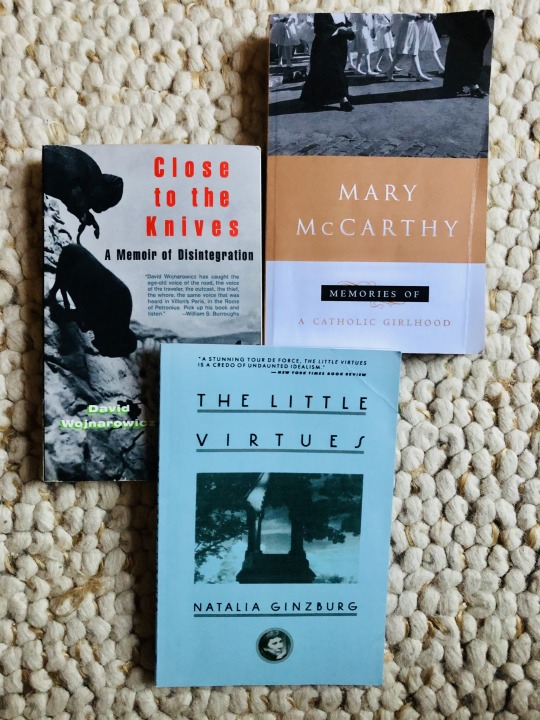
I would’ve never encountered these collections of my own volition without their inclusion on the reading list in Chee’s course, but I’m very happy that I read these. McCarthy’s essays are quite old, dating to the 50s and 60s, I believe, when they were originally published in The New Yorker. They’re all centered around her childhood years, either living with her grandparents or in an orphanage and they are remarkable portraits of intimacy and observation. The same with Ginzburg’s collection, although she writes in a much more enigmatic style. What inspired me most about her essays was how simultaneously aloof and vulnerable they are: she has a way of, say, writing about England, without ever even mentioning the name of the country, yet contriving a recognizable and incisive portrait of it, all from the vantage point of her own experience of the country during a certain time. Finally, there’s really nothing quite like Wojnarowicz’ book. It’s slightly Beat in tone, sometimes surreal and ecstatic, and then progressively more plainspoken and political. But it is all so very raw and pulsing with the heat of experience and desperation and anger. Wojnarowicz was an incredible artist, a sculptor and photographer and he lived in the East Village of the 80s and reports from the frontlines on the AIDS crisis. His work bears the stamp of a deeply tuned in artist confronting the hypocrisies and injustices of his time.
----------------------------------
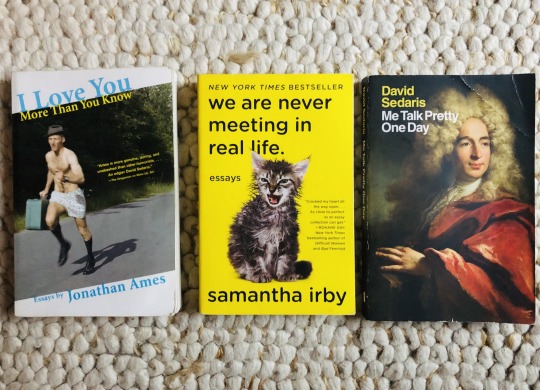
I put these three together mostly because these collections are explicitly comedic, although each has its own manner of using humor to communicate a deeper message. Jonathan Ames is well-known as a very funny novelist and the creator of the TV show Bored to Death. His essays are very short and very direct. There’s almost no commentary and he just narrates the events. The approach of leaving room for not knowing is very noticeable in his work, as he often qualifies his observations with humility and openness. The work comes across as very tender as a result. Irby is laugh-out-loud funny. I don’t know how she does it but she has a way of sending herself up and making fun of herself and her limitations that is both funny and painful at the same time. Commercialism, body positivity, and personal achievement are only some of the themes that are explored through that lens of self-effacement. Her ability to put herself under the most lacerating gaze of the authorial microscope and coming out the other end of that examination as a strong individual is unparalleled. I consider this volume must-reading material. In terms of exquisite construction and intelligence I would have to put Sedaris up high on the list, though his work is popular enough and his collections prodigious enough that his reputation for that kind of writing needs no further illustration here.
----------------------------------
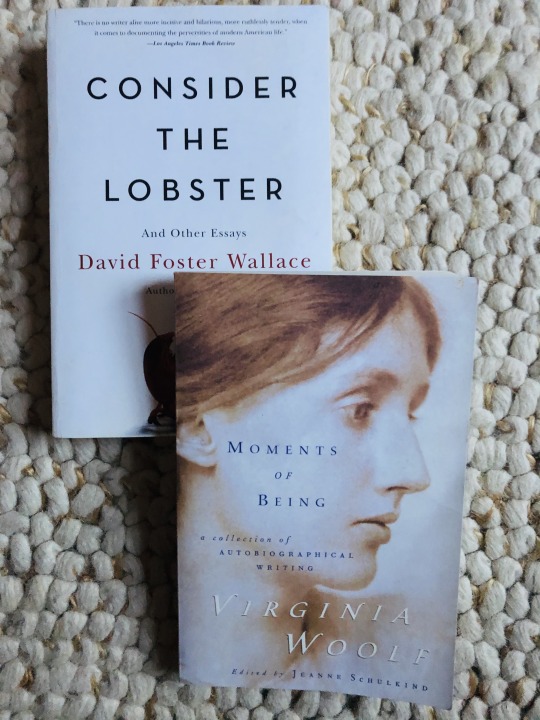
Virginia Woolf is popular as an essayist for collections published much earlier than Moments of Being, such as The London Scene. The essays here are actually very raw and unedited and so very sprawling, though obviously of high literary quality. She wrote them down like diary entries and then they were found after her death. They feel similarly to McCarthy’s essays in their naked observations of early childhood and family life. Juxtaposing this collection with DFW’s Consider the Lobster is a bold choice on my part, but it’s for the purpose of elucidating my previous point about that delicate “lean-to-fat” ratio I spoke about earlier in this blog post. Woolf’s posthumous collection is “all fat,” one could say, in that her focus is almost exhaustively on her own life and personal upbringing and subsequent marriage. These essays are basically memoir writing in the guise of the personal essay. DFW’s essays, by way of intense contrast, are almost “all lean,” in the sense that he spends almost no time talking about his personal life. The closest he gets to that is his essay on 9/11 where he goes over the details of where he was when it happened. The rest are what you’d expect from the author: penetrating accounts of the subtleties and hidden motivations of the cultures and people he investigates. He is basically like the most intelligent wartime journalist where his “wars” are the John McCain presidential campaign of 2000, the AVN Awards Ceremony, or the Maine Lobster festival.
----------------------------------
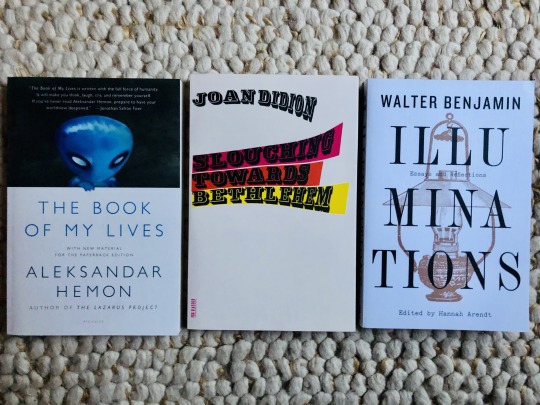
I have yet to read these collections but I’m very much looking forward to them. Hemon’s essays are about his upbringing in the war-plagued Balkans of the Nineties and subsequent emigration to the US. Didion’s basically needs no introduction as its de rigeur for essay writing. I’ve included Benjamin’s because of his critical insight. He’s not writing about his personal life, but his gifts for analysis will be really helpful to be exposed to for anyone undertaking the task of writing a personal essay. I have not included a picture of Susan Sontag’s collection Against Interpretation because it’s on order, but that one is also on deck. As are two other collections not pictured: Mary Oliver’s Upstream and Rebecca Solnit’s Hope in the Dark.
#charlesdambrosio#leslie jamison#james baldwin#vladmir nabokov#edmund white#frank mccourt#maya angelou#eveensler#joan didion#kay redfield jamison#jeannette walls#javiermarias#robert graves#elizabeth gilbert#hugohamilton#laurenslater#brianblanchfield#alexander chee#david wojnarowicz#mary mccarthy#natalia ginzburg#jonathanames#samantha irby#david sedaris#david foster wallace#virginia woolf#walter benjamin#aleksandar hemon#writing#memoir
17 notes
·
View notes
Note
I don’t think you need to be “diplomatic”, there’s a ton of people who are mad over TROS’ writing decisions esp about Rey, you should feel free to express your opinions in your own fandom space. As long as it’s tagged people can avoid it if they dislike it
Oh, I’m not diplomatic over tros at all because it is pure unmitigated trash and I refuse to pretend otherwise, I just mean it’s always been verboten to criticise Rey’s arc because that makes you sexist and I don’t want to deal with the even more of the bullshit ‘you’re just a horny fangirl!!!! you don’t care about anything except your baddangerous attraction to the bad man!!!’ legion in my inbox. So I feel like I have to be careful and mitigate everything to head that off at the pass. To the point I’ve seldom discussed the problems I had with her arc before tros and only rarely indicated how off base I think a lot of the fandom is in the ways they defend it. Apart from talking about fanfic lol.
Strangely, I actually care about the flaws in Rey’s arc because I’m a girl and would like to see female characters who are allowed to be full human beings and to have arcs as complex and compelling as male characters do. But if you reject this corporate American dude-with-tits permavirgin-with-no-desires father-figure-authority-worshipping Strong Female Character crap, you must be some neckbeard 45 year old dude who hates wimmins. Or you’re a self-insert shipper who can’t admit it and you secretly hate Rey. That comes from other women 99% of the time and it fucking gets me because it’s so fucking misogynist.
Like, I almost never brought up my many problems with TFA some of which TLJ doesn’t redeem, or the fact that I don’t think the prequels are good films, I have beefs with George Lucas and don’t think he’s an infallible genius, etc. I just didn’t want to get into stupid arguments with people I otherwise agreed with. This fandom is so terrible that it was worth focussing on the positive when it came to subjective things that aren’t massive dealbreakers. There’s loads of things I am always willing to throw down over, but I don’t want to fight about the prequels’ status as cinema if we can agree about the thematic sweep and overall aim/narrative/moral of SW. And shit like... I don’t want to fight about the term ‘Mary Sue’ even though I think it’s useful and apt and there's no reason not to use it correctly despite loads of people throwing it around wantonly. TROS Rey is a textbook Mary Sue but I’ve mostly avoided saying that because so many people in fandom want to ~reclaim~ the term and think it’s inherently sexist to suggest it’s a bad thing.
A Mary Sue (or Gary Stu) is a kind of bad writing, it doesn’t apply to characters being super mega ultra special or powerful if they’re still well-written characters. Luke is not a Stu and I’m so fucking sick and tired of seeing him used as an example of how the concept is sexist because sex is the only thing preventing people from reacting to him the same way they did to Rey. It’s just not fucking true. Luke is a much, much better character than Rey and if you compare his journey in ANH to hers in TFA, it’s real fucking easy to see why one feels earned and organic and one needed to be rescued by a better writer in order to avoid full-on Wesley Crusher-hood.
And then tros just confirms that apparently everyone except Rian wanted to writer her as a flawless avatar for the entire original universe, story, and characters to be warped around. For everyone to just love ever so much for no reason whatsoever, to never change or struggle or undergo any challenge because she’s already Born Worthy. And the company itself leans all the way into this (Terrio even going so far as to say that Han thought of her as his heir as well, like FUCKING HELL; nor is he the only one, it’s all the usual suspects with blue checkmarks) and somehow doesn’t realise the absolute garbage-tier shitty self-insert fanfic they’re writing??
#salt#sw#this has been in my drafts for months because I'm still hesitating#whattttttttevvvveerrrrr#real talk: she was never going to be as good a character as she should have been#even with a great ep ix#but she could have had a serviceable sw protagonist arc even if a bit uneven
49 notes
·
View notes
Text
A STUDY OF PERSONHOOD & ANNA MARIE. [ tw for sexual assault mention around third paragraph ]
A lack of touch turns an insidious condition over time, because it begins to infest you with the fear of whether you exist in the same plane as everyone else –– if you’re real. Talk allows for it, in parts, but little can compare to the act of feeling & the tangibility that comes along with it. And it goes further in the case of Anna Marie, who experiences this sense of separation constantly, but for whom identity is constantly a point of contention. From childhood, selfhood’s in peril with a lack of parentage to link your understanding of your own origins to (which in and of itself is one thing to come to terms with, but it’s more crucial that it adds to this increasing feeling of being on the fringe over time –– one drop in a bucket of Who Am I In The Scheme Of Things?).
Which comes next is a severing of her and an entity which for a while, during extremely important years of hers, she had the chance to identify with –– leaving the Brotherhood means a direct denial of the only mother she was able to be close with and learn from (M.ystique) as well as this entire ideology and practice. Very much every single aspect of identity and selfhood, being opinions/culture/family/etc., is left behind when she leaves for the X-Men, who also project onto her an identity she no longer feels a connection towards. So there’s this ongoing dichotomy between Anna Marie as she understands herself and Rogue as the X-Men understand her.
More obviously and formatively is her on-taking of Carol D/anver’s personality and memories around the age of seventeen (which I think is oft forgotten, the fact she was so young at the time of being sent on her first mission for the Brotherhood), linking herself for a series of years with someone else entirely and often literally losing her own consciousness and autonomy. She doesn’t get to shake this state of being for years, and it’s always a fight to do so. I think it’s worsened, too, by exterior trauma�� (both the ongoing issue of her mixed feelings for Mystique, the difficulty in her relationships with the X-Men, the actual trauma of being ultimately only “useful” as a tool for action and fights –– especially given she isn’t creating any meaningful dynamics, for now, outside of being a fighter, then we have what I think is a big one not only in terms of general traumatic experiences but also in terms of her dynamic directly to the Carol personality, which is when she’s sexually assaulted by guards in Genosha).
I think this showcases itself in a lot of ways as Rogue’s childishness and brashness and ongoing journey, which often relates to her being both aggressive and off-putting at times, as well as eager to please and prove herself (because in doing so, I think she believes it will give her a sense of accomplishment all to her own –– to prove herself as worthy and contained, on her own, means to be a full person capable of handling her shit). Throughout her twenties in particular she’s essentially etching out a sense of self that most experienced during their childhood/teenagehood. Having never really got that chance, and being a victim of many events which set her back in that specific type of development, this is something she has to deal with way longer than average.
Something to be delved into in further meta but I think deserves mention here just briefly as a large moment in this ongoing journey of selfhood, is the concrete relationship between herself and N.ightcrawler which allows a closer experience of family than she has had in a long time (she is quick, I think, to absorb this news into her own personal narrative: this gives her a context she longs for, constantly, and though she moves forward without being obvious, I think it’s internally a huge deal for her).
6 notes
·
View notes
Note
anemone : how does your muse view the world ; as a cruel & unforgiving place , a land full of wonders , or something in - between ? where does that world view come from ( what experiences , life lessons , etc . ) ? (whoever you're feeling)

Riley has viewed the world as an endless journey of pain for so long. More often than not it is self inflicted but that doesn't hurt any less.
He has carried pain inside since he was a boy, it is a heavy, nameless kind. Familiar and always there.
Since meeting Mari and falling for her and feeling his darkness be more embraced than ever, he has seen the world's potential of being beautiful grow exponentially.
Like stars suddenly glowing in what was once a black, empty void.
His experiences of trying to become what everyone wanted but also be powerful and different enough to like himself has made him realize how little he valued himself. As he never felt valued by anyone but Jessica when he was young and took that love for granted.
The deterioration of his memory has been a blessing and a curse. A blessing as some of the most painful points of his life and that pain he carried is no longer reachable within in his mind.
And a curse because he worries he will completely lose his sense of identity and sense of self.
Realizing how much he actually cares for himself only after he feels as though he is in danger of losing himself entirely.
With Mari, all things seem possible. The past is fading memories he no longer needs. The present and future are being brought into extreme focus and he feels more possibility to live a good life than he ever had before.
As long as his mind and identity aren't completely lost before then. He feels safety in Mari, believing that should he lose sense of who he is, she will stick by him and try to salvage him or even entirely save him. He believes in her. And with her, and her love, he believes in his own future more than ever.
2 notes
·
View notes